Vocal Sheet Music
 "Music is the universal language of mankind. " Henry Wadsworth Longfellow,Outre-Mer
"Music is the universal language of mankind. " Henry Wadsworth Longfellow,Outre-Mer
Bee Gees
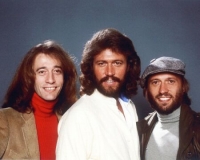
The Bee Gees were a singing trio of brothers — Barry, Robin, and Maurice Gibb. They were born on the Isle of Man to English parents, lived in Chorlton, Manchester, England and during their childhood years moved to Brisbane, Australia, where they began their musical careers. Their worldwide success came when they returned to England and signed with producer Robert Stigwood.
The multiple award-winning group was successful for most of its forty years of recording music, but it had two distinct periods of exceptional success: as a harmonic "soft rock" act in the late 1960s and early 1970s, and as the foremost stars of the disco music era in the late 1970s.
No matter the style, the Bee Gees sang three-part tight harmonies that were instantly recognizable; as brothers, their voices blended perfectly, in the same way that The Everly Brothers and Beach Boys did. Barry sang lead on many songs, and an R&B falsetto introduced in the disco years; Robin provided the clear vibrato lead that was a hallmark of their pre-disco music; Maurice sang high and low harmonies throughout their career. The three brothers co-wrote most of their hits, and they said that they felt like they became 'one person' when they were writing. The group's name was retired after Maurice died in January 2003.
The Bee Gees were inducted into The Rock and Roll Hall of Fame in 1997; fittingly, the presenter of the award to "Britain's first family of harmony" was Brian Wilson, leader of the Beach Boys, America's first family of rock harmony.
It has been estimated that the Bee Gees' record sales total more than 220 million, easily making them one of the best-selling music artists of all-time. The above figure in record sales does not include record sales for artists for whom they have written and with whom they have collaborated. Their 1997 Rock and Roll Hall of Fame citation says "Only Elvis Presley, The Beatles, Michael Jackson, Garth Brooks and Paul McCartney have outsold the Bee Gees".
The multiple award-winning group was successful for most of its forty years of recording music, but it had two distinct periods of exceptional success: as a harmonic "soft rock" act in the late 1960s and early 1970s, and as the foremost stars of the disco music era in the late 1970s.
No matter the style, the Bee Gees sang three-part tight harmonies that were instantly recognizable; as brothers, their voices blended perfectly, in the same way that The Everly Brothers and Beach Boys did. Barry sang lead on many songs, and an R&B falsetto introduced in the disco years; Robin provided the clear vibrato lead that was a hallmark of their pre-disco music; Maurice sang high and low harmonies throughout their career. The three brothers co-wrote most of their hits, and they said that they felt like they became 'one person' when they were writing. The group's name was retired after Maurice died in January 2003.
The Bee Gees were inducted into The Rock and Roll Hall of Fame in 1997; fittingly, the presenter of the award to "Britain's first family of harmony" was Brian Wilson, leader of the Beach Boys, America's first family of rock harmony.
It has been estimated that the Bee Gees' record sales total more than 220 million, easily making them one of the best-selling music artists of all-time. The above figure in record sales does not include record sales for artists for whom they have written and with whom they have collaborated. Their 1997 Rock and Roll Hall of Fame citation says "Only Elvis Presley, The Beatles, Michael Jackson, Garth Brooks and Paul McCartney have outsold the Bee Gees".
Johnny Mercer
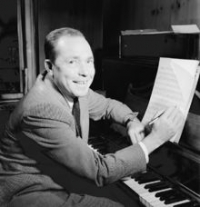
John Herndon "Johnny" Mercer (November 18, 1909 – June 25, 1976) was an American lyricist, songwriter and singer. He was also the founder of Capitol Records.
He is best known as a lyricist, but he also composed music. He was also a popular singer who recorded his own songs as well as those written by others. From the mid-1930s through the mid-1950s, many of the songs Mercer wrote and performed were among the most popular hits of the time. He wrote the lyrics to more than fifteen hundred songs, including compositions for movies and Broadway shows. He received nineteen Academy Award nominations, and won four Best Original Song Oscars.
He is best known as a lyricist, but he also composed music. He was also a popular singer who recorded his own songs as well as those written by others. From the mid-1930s through the mid-1950s, many of the songs Mercer wrote and performed were among the most popular hits of the time. He wrote the lyrics to more than fifteen hundred songs, including compositions for movies and Broadway shows. He received nineteen Academy Award nominations, and won four Best Original Song Oscars.
Antonio Carlos Jobim

Antonio Carlos Brasileiro de Almeida Jobim (January 25, 1927 in Rio de Janeiro – December 8, 1994 in New York City), also known as Tom Jobim, was a Grammy Award-winning Brazilian songwriter, composer, arranger, singer, and pianist/guitarist. A primary force behind the creation of the bossa nova style, Jobim is acknowledged as one of the most influential popular composers of the 20th century. His songs have been performed by many singers and instrumentalists within Brazil and internationally.
Edith Piaf
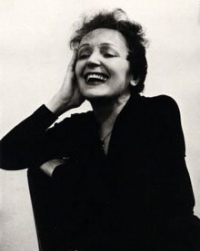
Édith Piaf (19 December 1915—10 October 1963) was a French singer and cultural icon who "is almost universally regarded as France's greatest popular singer." Her singing reflected her life, with her specialty being the ballads. Among her famous songs are "La vie en rose" (1946), "Hymne à l'amour" (1949), "Milord" (1959), "Non, je ne regrette rien" (1960), and Padam Padam.
Edith Piaf's signature song "La vie en rose" was written in 1945 and was voted a Grammy Hall of Fame Award in 1998.
The legendary Paris Olympia concert hall is where Piaf achieved lasting fame, giving several series of concerts at the hall, the most famous venue in Paris, between January 1955 and October 1962. Excerpts from five of these concerts (1955, 1956, 1958, 1961, 1962) were issued on record and CD and have never been out of print. The 1961 concerts were promised by Piaf in an effort to save the venue from bankruptcy and where she debuted her song "Non, je ne regrette rien". In April 1963, Piaf recorded her last song, "L'homme de Berlin".
Edith Piaf's signature song "La vie en rose" was written in 1945 and was voted a Grammy Hall of Fame Award in 1998.
The legendary Paris Olympia concert hall is where Piaf achieved lasting fame, giving several series of concerts at the hall, the most famous venue in Paris, between January 1955 and October 1962. Excerpts from five of these concerts (1955, 1956, 1958, 1961, 1962) were issued on record and CD and have never been out of print. The 1961 concerts were promised by Piaf in an effort to save the venue from bankruptcy and where she debuted her song "Non, je ne regrette rien". In April 1963, Piaf recorded her last song, "L'homme de Berlin".
Leos Janacek
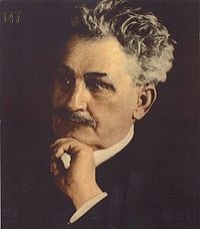
Leoš Janáček (Czech pronunciation: ( listen)) (baptised Leo Eugen Janáček) (July 3, 1854 – August 12, 1928), was a Czech composer, musical theorist, folklorist, publicist and teacher. He was inspired by Moravian and all Slavic folk music to create an original, modern musical style. Until 1895 he devoted himself mainly to folkloristic research and his early musical output was influenced by contemporaries such as Antonín Dvořák. His later, mature works incorporate his earlier studies of national folk music in a modern, highly original synthesis, first evident in the opera Jenůfa, which was premiered in 1904 in Brno. The success of Jenůfa (often called the "Moravian national opera") at Prague in 1916 gave Janáček access to the world's great opera stages. Janáček's later works are his most celebrated. They include the symphonic poem Sinfonietta, the oratorial Glagolitic Mass, the rhapsody Taras Bulba, string quartets, other chamber works and operas. He is considered to rank with Antonín Dvořák and Bedřich Smetana, as one of the most important Czech composers.
Charlie Daniels Band
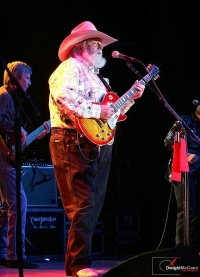
Charles Edward "Charlie" Daniels (born on October 28, 1936) is an American musician known for his contributions to country and southern rock music. He is known primarily for his number one country hit "The Devil Went Down to Georgia", and multiple other songs he has performed and written. Daniels has been active as a singer since the early 1950s. He was inducted into the Grand Ole Opry on January 24, 2008.
Ramón Tapales
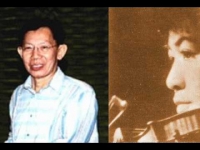
ilipino composer and conductor . He had his first training in solfège and the violin from his father; and continued violin lessons at the age of 12 with Abdon. In 1923 he went to Europe for further studies at the Milan Conservatory (from which he graduated in 1929), with Flesch at the Berlin Hochschule and with Kaplan at the Klindworth-Scharwenka Conservatory; he also studied composition with Butting and conducting with Robitsok. In Riga he appeared as guest conductor of the National Opera. After returning to the...
Offenbach

Jacques Offenbach (20 June 1819 – 5 October 1880) was a Prussian-born French composer, cellist and impresario. He is remembered for his nearly 100 operettas of the 1850s–1870s and his uncompleted opera The Tales of Hoffmann. He was a powerful influence on later composers of the operetta genre, particularly Johann Strauss, Jr. and Arthur Sullivan. His best-known works were continually revived during the 20th century, and many of his operettas continue to be staged in the 21st. The Tales of Hoffman remains part of the standard opera repertory.
Hans Zimmer

Hans Florian Zimmer (born September 12, 1957) is a German film score composer and music producer. He has composed music for over 100 films, including Hollywood blockbusters such as the Pirates of the Caribbean series, Gladiator, The Lion King, The Da Vinci Code and The Dark Knight.
Zimmer spent the early part of his career in the United Kingdom before moving to the United States. He is the head of the film music division at DreamWorks studios, and works with other composers through the company which he founded, Remote Control Productions. His work is notable for integrating electronic music sounds with traditional orchestral arrangements.
Zimmer spent the early part of his career in the United Kingdom before moving to the United States. He is the head of the film music division at DreamWorks studios, and works with other composers through the company which he founded, Remote Control Productions. His work is notable for integrating electronic music sounds with traditional orchestral arrangements.
Felix Mendelssohn

Jakob Ludwig Felix Mendelssohn Bartholdy, born, and generally known in English-speaking countries, as Felix Mendelssohn (February 3, 1809 – November 4, 1847) was a German composer, pianist, organist and conductor of the early Romantic period.
The grandson of the philosopher Moses Mendelssohn, he was born into a notable Jewish family, although he himself was brought up initially without religion, and later as a Lutheran. He was recognized early as a musical prodigy, but his parents were cautious and did not seek to capitalise on his abilities. Indeed his father was disinclined to allow Felix to follow a musical career until it became clear that he intended to seriously dedicate himself to it.
Early success in Germany was followed by travel throughout Europe; Mendelssohn was particularly well received in England as a composer, conductor and soloist, and his ten visits there, during which many of his major works were premiered, form an important part of his adult career. His essentially conservative musical tastes however set him apart from many of his more adventurous musical contemporaries such as Liszt, Wagner and Berlioz. The Conservatory he founded at Leipzig became a bastion of this anti-radical outlook.
Mendelssohn's work includes symphonies, concerti, oratorios, piano and chamber music. He also had an important role in the revival of interest in the music of Johann Sebastian Bach. After a long period of relative denigration due to changing musical tastes and antisemitism in the late 19th and early 20th centuries, his creative originality is now being recognized and re-evaluated. He is now among the most popular composers of the Romantic era.
The grandson of the philosopher Moses Mendelssohn, he was born into a notable Jewish family, although he himself was brought up initially without religion, and later as a Lutheran. He was recognized early as a musical prodigy, but his parents were cautious and did not seek to capitalise on his abilities. Indeed his father was disinclined to allow Felix to follow a musical career until it became clear that he intended to seriously dedicate himself to it.
Early success in Germany was followed by travel throughout Europe; Mendelssohn was particularly well received in England as a composer, conductor and soloist, and his ten visits there, during which many of his major works were premiered, form an important part of his adult career. His essentially conservative musical tastes however set him apart from many of his more adventurous musical contemporaries such as Liszt, Wagner and Berlioz. The Conservatory he founded at Leipzig became a bastion of this anti-radical outlook.
Mendelssohn's work includes symphonies, concerti, oratorios, piano and chamber music. He also had an important role in the revival of interest in the music of Johann Sebastian Bach. After a long period of relative denigration due to changing musical tastes and antisemitism in the late 19th and early 20th centuries, his creative originality is now being recognized and re-evaluated. He is now among the most popular composers of the Romantic era.
Professor Longhair
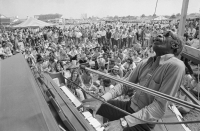
Henry Roeland "Roy" Byrd (December 19, 1918 – January 30, 1980), better known as Professor Longhair or "Fess" for short, was a New Orleans blues singer and pianist. He was active in two distinct periods, first in the heyday of early rhythm and blues and later in the resurgence of interest in traditional jazz after the founding of the New Orleans Jazz and Heritage Festival in 1970. His piano style has been described as "instantly recognizable, combining rumba, mambo, and calypso."
The music journalist Tony Russell (in his book The Blues: From Robert Johnson to Robert Cray) wrote that "The vivacious rhumba-rhythmed piano blues and choked singing typical of Fess were too weird to sell millions of records; he had to be content with siring musical offspring who were simple enough to manage that, like Fats Domino or Huey "Piano" Smith. But he is also acknowledged as a father figure by subtler players like Allen Toussaint and Dr. John."
The music journalist Tony Russell (in his book The Blues: From Robert Johnson to Robert Cray) wrote that "The vivacious rhumba-rhythmed piano blues and choked singing typical of Fess were too weird to sell millions of records; he had to be content with siring musical offspring who were simple enough to manage that, like Fats Domino or Huey "Piano" Smith. But he is also acknowledged as a father figure by subtler players like Allen Toussaint and Dr. John."
Neil Young

Neil Percival Young OM (born November 12, 1945, Toronto, Ontario) is a Canadian singer-songwriter, musician and film director.
Young's work is characterized by deeply personal lyrics, distinctive guitar work, and signature nasal tenor singing voice. Although he accompanies himself on several different instruments—including piano and harmonica—his style of claw-hammer acoustic guitar and often idiosyncratic soloing on electric guitar are the linchpins of a sometimes ragged, sometimes polished sound. Although Young has experimented widely with differing music styles, including swing, jazz, rockabilly, blues, and electronic music throughout a varied career, his best known work usually falls into either of two distinct styles: folk-esque acoustic rock (as heard in songs such as "Heart of Gold", "Harvest Moon" and "Old Man") and electric-charged hard rock (in songs like "Cinnamon Girl", "Rockin' in the Free World" and "Hey Hey, My My (Into the Black)"). In more recent years, Young has started to adopt elements from newer styles of music, such as industrial, alternative country and grunge, the latter of which was profoundly influenced by his own style of playing, causing some to confer on him the title of "the godfather of grunge".
Young has directed (or co-directed) a number of films using the pseudonym Bernard Shakey, including Journey Through the Past (1973), Rust Never Sleeps (1979), Human Highway (1982), and Greendale (2003).
He is also an outspoken advocate for environmental issues and small farmers, having co-founded in 1985 the benefit concert Farm Aid, and in 1986 helped found The Bridge School, and its annual supporting Bridge School Benefit concerts, together with his wife Pegi.
Young's work is characterized by deeply personal lyrics, distinctive guitar work, and signature nasal tenor singing voice. Although he accompanies himself on several different instruments—including piano and harmonica—his style of claw-hammer acoustic guitar and often idiosyncratic soloing on electric guitar are the linchpins of a sometimes ragged, sometimes polished sound. Although Young has experimented widely with differing music styles, including swing, jazz, rockabilly, blues, and electronic music throughout a varied career, his best known work usually falls into either of two distinct styles: folk-esque acoustic rock (as heard in songs such as "Heart of Gold", "Harvest Moon" and "Old Man") and electric-charged hard rock (in songs like "Cinnamon Girl", "Rockin' in the Free World" and "Hey Hey, My My (Into the Black)"). In more recent years, Young has started to adopt elements from newer styles of music, such as industrial, alternative country and grunge, the latter of which was profoundly influenced by his own style of playing, causing some to confer on him the title of "the godfather of grunge".
Young has directed (or co-directed) a number of films using the pseudonym Bernard Shakey, including Journey Through the Past (1973), Rust Never Sleeps (1979), Human Highway (1982), and Greendale (2003).
He is also an outspoken advocate for environmental issues and small farmers, having co-founded in 1985 the benefit concert Farm Aid, and in 1986 helped found The Bridge School, and its annual supporting Bridge School Benefit concerts, together with his wife Pegi.
The Pussycat Dolls

Pussycat Dolls (abbreviated to PCD) are an American girl group and dance ensemble founded by choreographer Robin Antin in 1995 as a burlesque troupe based in Los Angeles. After attracting national attention, Antin eventually negotiated a record deal with Interscope Records in 2003 turning the group into a music franchise, comprising Nicole Scherzinger alongside Carmit Bachar, Melody Thornton, Jessica Sutta, Ashley Roberts and Kimberly Wyatt. Since then the group has developed a global image and commercial brand overseen by Antin, Interscope and various partners. They have diversified into reality television programs, a Las Vegas act and product endorsements amongst other things.
Success as a music group came in 2005 with their first album PCD which debuted at number five in the US producing three successful singles "Don't Cha", "Buttons", and "Stickwitu"; the latter earned the group a Grammy Award nomination. Following the departure of Carmit Bachar in February 2008, the group continued as a quintet and in September of that year they released their second album, Doll Domination, spawning singles "When I Grow Up", "I Hate This Part" and "Jai Ho! (You Are My Destiny)".
Success as a music group came in 2005 with their first album PCD which debuted at number five in the US producing three successful singles "Don't Cha", "Buttons", and "Stickwitu"; the latter earned the group a Grammy Award nomination. Following the departure of Carmit Bachar in February 2008, the group continued as a quintet and in September of that year they released their second album, Doll Domination, spawning singles "When I Grow Up", "I Hate This Part" and "Jai Ho! (You Are My Destiny)".
Regina Spektor

Regina Spektor (born February 18, 1980) is a Soviet-born Jewish-American singer-songwriter and pianist. Her music is associated with the anti-folk scene centered on New York City's East Village.
Spektor has said that she has created 700 songs, but that she rarely writes any of them down. She has also stated that she never aspired to write songs herself, but songs seem to just flow to her. Spektor possesses a broad vocal range and uses the full extent of it. She also explores a variety of different and somewhat unorthodox vocal techniques, such as verses composed entirely of buzzing noises made with the lips and beatbox-style flourishes in the middle of ballads, and also makes use of such unusual musical techniques as using a drum stick to tap rhythms on the body of the piano or chair.
Her lyrics are equally eclectic, often taking the form of abstract narratives or first-person character studies, similar to short stories or vignettes put to song. Spektor usually sings in English, though she sometimes includes a few words or verses of Latin, Russian, French, and other languages in her songs.
Spektor has said that she has created 700 songs, but that she rarely writes any of them down. She has also stated that she never aspired to write songs herself, but songs seem to just flow to her. Spektor possesses a broad vocal range and uses the full extent of it. She also explores a variety of different and somewhat unorthodox vocal techniques, such as verses composed entirely of buzzing noises made with the lips and beatbox-style flourishes in the middle of ballads, and also makes use of such unusual musical techniques as using a drum stick to tap rhythms on the body of the piano or chair.
Her lyrics are equally eclectic, often taking the form of abstract narratives or first-person character studies, similar to short stories or vignettes put to song. Spektor usually sings in English, though she sometimes includes a few words or verses of Latin, Russian, French, and other languages in her songs.
Marvin Hamlisch
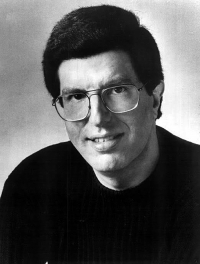
Marvin Frederick Hamlisch (June 2, 1944 – August 6, 2012) was an American composer and conductor. Hamlisch was one of only sixteen people to win Emmy, Grammy, Oscar and Tony awards. This collection of all four is referred to as an "EGOT". He is one of only two people (along with composer Richard Rodgers) to have won those four prizes and a Pulitzer Prize ("PEGOT").
Stevie Wonder

Stevie Wonder (born Stevland Hardaway Judkins on May 13, 1950, name later changed to Stevland Hardaway Morris) is an American singer-songwriter, multi-instrumentalist, and record producer. A prominent figure in popular music during the latter half of the 20th century , Wonder has recorded more than thirty top ten hits, won 26 Grammy Awards (a record for a solo artist), plus one for lifetime achievement, won an Academy Award for Best Song and been inducted into both the Rock and Roll and Songwriters halls of fame. He has also been awarded the Polar Music Prize.
Blind from infancy, Wonder signed with Motown Records as a pre-adolescent at age twelve, and continues to perform and record for the label to this day. He has nine U.S. number-one hits to his name (on the pop Charts, 20 U.S. R&B number one hits), and album sales totaling more than 150 million units. Wonder has recorded several critically acclaimed albums and hit singles, and writes and produces songs for many of his label mates and outside artists as well. Wonder plays the piano, synthesizer, harmonica, congas, drums, bongos, organ, melodica, and clavinet. In his early career, he was best known for his harmonica work, but today he is better known for his keyboard skills and vocals.
Blind from infancy, Wonder signed with Motown Records as a pre-adolescent at age twelve, and continues to perform and record for the label to this day. He has nine U.S. number-one hits to his name (on the pop Charts, 20 U.S. R&B number one hits), and album sales totaling more than 150 million units. Wonder has recorded several critically acclaimed albums and hit singles, and writes and produces songs for many of his label mates and outside artists as well. Wonder plays the piano, synthesizer, harmonica, congas, drums, bongos, organ, melodica, and clavinet. In his early career, he was best known for his harmonica work, but today he is better known for his keyboard skills and vocals.
Metallica

Metallica is an American heavy metal band that formed in 1981 in Los Angeles, California. Founded when drummer Lars Ulrich posted an advertisement in a Los Angeles newspaper, Metallica's original line-up consisted of Ulrich, rhythm guitarist and vocalist James Hetfield, lead guitarist Dave Mustaine, and bassist Ron McGovney. These last two were later replaced from the band, in favor of Kirk Hammett and Cliff Burton, respectively. In September 1986, Metallica's tour bus skidded out of control and flipped, which resulted in Burton being crushed under the bus and killed. Jason Newsted replaced him less than two months later. Newsted left the band in 2001 and was replaced by Robert Trujillo in 2003.
Metallica's early releases included fast tempos, instrumentals, and aggressive musicianship that placed them as one of the "Big Four" of the thrash metal subgenre alongside Slayer, Megadeth and Anthrax. The band earned a growing fan base in the underground music community, and some critics say the 1986 release Master of Puppets is one of the most influential and "heavy" thrash metal albums. The band achieved substantial commercial success with its self-titled 1991 album, which debuted at number one on the Billboard 200. Some critics and fans believed the band changed its musical direction to appeal to the mainstream audience. With the release of Load in 1996, Metallica distanced itself from earlier releases in what has been described as "an almost alternative rock approach", and the band faced accusations of "selling out".
In 2000, Metallica was among several artists who filed a lawsuit against Napster for sharing the band's copyright-protected material for free without the band members' consent. A settlement was reached, and Napster became a pay-to-use service. Despite reaching number one on the Billboard 200, the release of St. Anger in 2003 disappointed some critics and fans with the exclusion of guitar solos, and the "steel-sounding" snare drum. A film titled Some Kind of Monster documented the recording process of St. Anger.
Metallica's early releases included fast tempos, instrumentals, and aggressive musicianship that placed them as one of the "Big Four" of the thrash metal subgenre alongside Slayer, Megadeth and Anthrax. The band earned a growing fan base in the underground music community, and some critics say the 1986 release Master of Puppets is one of the most influential and "heavy" thrash metal albums. The band achieved substantial commercial success with its self-titled 1991 album, which debuted at number one on the Billboard 200. Some critics and fans believed the band changed its musical direction to appeal to the mainstream audience. With the release of Load in 1996, Metallica distanced itself from earlier releases in what has been described as "an almost alternative rock approach", and the band faced accusations of "selling out".
In 2000, Metallica was among several artists who filed a lawsuit against Napster for sharing the band's copyright-protected material for free without the band members' consent. A settlement was reached, and Napster became a pay-to-use service. Despite reaching number one on the Billboard 200, the release of St. Anger in 2003 disappointed some critics and fans with the exclusion of guitar solos, and the "steel-sounding" snare drum. A film titled Some Kind of Monster documented the recording process of St. Anger.
Cabaret
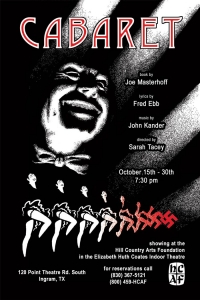
Cabaret is a musical with a book by Joe Masteroff, lyrics by Fred Ebb, and music by John Kander. The 1966 Broadway production became a hit and spawned an acclaimed 1972 film as well as numerous subsequent productions.
Originally entitled Welcome to Berlin, it is based on John Van Druten's play I Am a Camera, which in turn was adapted from the novel Goodbye to Berlin, by Christopher Isherwood. Set in 1929-1930 Berlin on the eve of the Nazis' rise to power, it focuses on nightlife at the seedy Kit Kat Klub and mostly revolves around the English 19-year-old cabaret performer Sally Bowles and her relationship with young American writer, Cliff Bradshaw. A sub-plot involves the doomed romance between German boarding house owner Fräulein Schneider and her elderly suitor Herr Schultz, a Jewish fruit vendor. Overseeing the action is the Emcee, who presides as master of ceremonies at the Kit Kat Klub and serves as a constant metaphor for the current state of society in Weimar Germany throughout the show.
Originally entitled Welcome to Berlin, it is based on John Van Druten's play I Am a Camera, which in turn was adapted from the novel Goodbye to Berlin, by Christopher Isherwood. Set in 1929-1930 Berlin on the eve of the Nazis' rise to power, it focuses on nightlife at the seedy Kit Kat Klub and mostly revolves around the English 19-year-old cabaret performer Sally Bowles and her relationship with young American writer, Cliff Bradshaw. A sub-plot involves the doomed romance between German boarding house owner Fräulein Schneider and her elderly suitor Herr Schultz, a Jewish fruit vendor. Overseeing the action is the Emcee, who presides as master of ceremonies at the Kit Kat Klub and serves as a constant metaphor for the current state of society in Weimar Germany throughout the show.
Vu Thanh An

Vu Thanh An (born 1943) was one of the prominent musicians of South Vietnam from 1954 to 1975. The "Untitled" articles are his famous works. Currently, he is a deacon of the Roman Catholic Church, ceasing to compose love songs, but only composing hymns.
Pamela Wedgwood
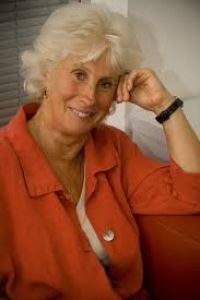
Born in 1947, Pam’s musical career began with the recorder and piano, and Tenor Horn and Euphonium through the brass band tradition at her school. She then took up the Cello and French Horn, entering Trinity College of Music in London to study Piano, Horn, Cello and composition at the age of sixteen.
György Ligeti
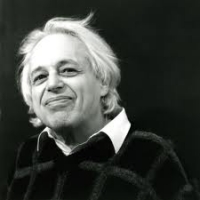
György Sándor Ligeti (May 28, 1923 – June 12, 2006) was a composer, born in a Hungarian Jewish family in Transylvania, Romania. He briefly lived in Hungary before later becoming an Austrian citizen. Many of his works are well known in classical music circles, but to the general public, he is best-known for the various pieces featured in the Stanley Kubrick films 2001: A Space Odyssey, The Shining, and Eyes Wide Shut.
Ligeti's music is best-known to the general public for its use in the films of Stanley Kubrick. The soundtrack to 2001: A Space Odyssey includes four of his pieces: Atmosphères, Lux Aeterna (for the moon-bus scene en route to the TMA-1 monolith in the crater Tycho), Requiem (the Kyrie section), and an electronically altered version of Aventures (in the cryptic final scenes). Some of this music was used again in Peter Hyams's 1984 sequel film, 2010. Kubrick's The Shining uses Lontano for orchestra. The second of Ligeti's Musica ricercata is used extensively in Eyes Wide Shut.
Ligeti's music is best-known to the general public for its use in the films of Stanley Kubrick. The soundtrack to 2001: A Space Odyssey includes four of his pieces: Atmosphères, Lux Aeterna (for the moon-bus scene en route to the TMA-1 monolith in the crater Tycho), Requiem (the Kyrie section), and an electronically altered version of Aventures (in the cryptic final scenes). Some of this music was used again in Peter Hyams's 1984 sequel film, 2010. Kubrick's The Shining uses Lontano for orchestra. The second of Ligeti's Musica ricercata is used extensively in Eyes Wide Shut.
Leonard Cohen
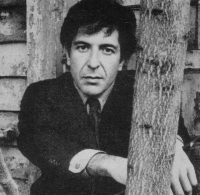
Leonard Norman Cohen, CC, GOQ (born September 21, 1934) is a Canadian singer-songwriter, musician, poet and novelist. Cohen published his first book of poetry in Montreal in 1956 and his first novel in 1963. His work often deals with the exploration of religion, isolation, sexuality and complex interpersonal relationships. Famously reclusive, spending years in a Zen Buddhist monastery, and possessing a persona frequently associated with mystique, he is extremely well-regarded by critics for his literary accomplishments and for producing an output of work of high artistic quality over a five-decade career.
Musically, Cohen's earliest songs (many of which appeared on the 1967 album, Songs of Leonard Cohen) were rooted in European folk music. In the 1970s, his material encompassed pop, cabaret and world music. Since the 1980s his high baritone voice has evolved into lower registers (bass baritone and bass), with accompaniment from a wide variety of instruments and female backing singers.
Over 2,000 renditions of Cohen's songs have been recorded. Cohen has been inducted into both the Canadian Music Hall of Fame and the Canadian Songwriters Hall of Fame and is also a Companion of the Order of Canada, the nation's highest civilian honour. While giving the speech at Cohen's induction into the American Rock and Roll Hall of Fame on March 10, 2008, Lou Reed described Cohen as belonging to the "highest and most influential echelon of songwriters".
Musically, Cohen's earliest songs (many of which appeared on the 1967 album, Songs of Leonard Cohen) were rooted in European folk music. In the 1970s, his material encompassed pop, cabaret and world music. Since the 1980s his high baritone voice has evolved into lower registers (bass baritone and bass), with accompaniment from a wide variety of instruments and female backing singers.
Over 2,000 renditions of Cohen's songs have been recorded. Cohen has been inducted into both the Canadian Music Hall of Fame and the Canadian Songwriters Hall of Fame and is also a Companion of the Order of Canada, the nation's highest civilian honour. While giving the speech at Cohen's induction into the American Rock and Roll Hall of Fame on March 10, 2008, Lou Reed described Cohen as belonging to the "highest and most influential echelon of songwriters".
Bob Chilcott
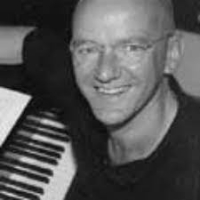
Robert "Bob" Chilcott (born 9 April 1955) is a British choral composer, conductor, and singer, based in Oxfordshire, England. He was a member of the King's Singers from 1985 to 1997, singing tenor. He has been a composer since 1997.Chilcott was born in Plymouth. He sang in the Choir of King's College, Cambridge, both as a boy and as a university student, when he conducted the voluntary Choral Society, which included many singers from other colleges. He performed the Pie Jesu of Fauré's Requiem on the 1967 King's College recording.
Cat Stevens
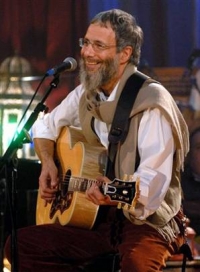
Yusuf Islam, (born Steven Demetre Georgiou on 21 July 1948), best known by his former stage name Cat Stevens, is a British musician of Greek Cypriot and Swedish ancestry. He is a singer-songwriter, multi-instrumentalist, educator, philanthropist and prominent convert to Islam.
As Cat Stevens, he sold over 60 million albums around the world since the late 1960s. His albums Tea for the Tillerman and Teaser and the Firecat were both certified as Triple Platinum by the RIAA in the United States (three million sales each); his album Catch Bull at Four sold half a million copies in the first two weeks of release alone, and was Billboard's number-one LP for three consecutive weeks. His songwriting has also earned him two ASCAP songwriting awards for "The First Cut Is the Deepest," which has been a hit single for five different artists, and has been instrumental for others in establishing their musical careers.
Stevens converted to Islam at the height of his fame in 1977. The following year, he adopted his Muslim name Yusuf Islam, sold all his instruments and awards for charity, and left his music career to devote himself to educational and philanthropic causes in the Muslim community. He turned to his mother to help him decide the best candidate to wed, and thus, in an arranged marriage, took his vows with Fauzia Mubarak Ali, eventually producing five living children from the union.
He has been given several awards for his work in promoting peace in the world, including 2003's World Award, the 2004 Man for Peace award, and the 2007 Mediterranean Prize for Peace. In 2006, he returned to pop music, with his first album of new pop songs in 28 years, entitled An Other Cup.
He lives with his wife, children and grand-child in London. Yusuf Islam spends part of each year in Dubai.
As Cat Stevens, he sold over 60 million albums around the world since the late 1960s. His albums Tea for the Tillerman and Teaser and the Firecat were both certified as Triple Platinum by the RIAA in the United States (three million sales each); his album Catch Bull at Four sold half a million copies in the first two weeks of release alone, and was Billboard's number-one LP for three consecutive weeks. His songwriting has also earned him two ASCAP songwriting awards for "The First Cut Is the Deepest," which has been a hit single for five different artists, and has been instrumental for others in establishing their musical careers.
Stevens converted to Islam at the height of his fame in 1977. The following year, he adopted his Muslim name Yusuf Islam, sold all his instruments and awards for charity, and left his music career to devote himself to educational and philanthropic causes in the Muslim community. He turned to his mother to help him decide the best candidate to wed, and thus, in an arranged marriage, took his vows with Fauzia Mubarak Ali, eventually producing five living children from the union.
He has been given several awards for his work in promoting peace in the world, including 2003's World Award, the 2004 Man for Peace award, and the 2007 Mediterranean Prize for Peace. In 2006, he returned to pop music, with his first album of new pop songs in 28 years, entitled An Other Cup.
He lives with his wife, children and grand-child in London. Yusuf Islam spends part of each year in Dubai.
Kirk Franklin
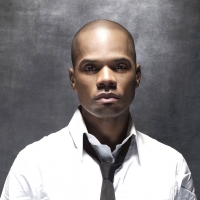
Kirk Dewayne Franklin (born January 26, 1970) is an American gospel musician, choir director, and author. He is known for leading urban contemporary gospel choirs such as The Family, God's Property and One Nation Crew (1NC), and has won multiple awards, including seven Grammy Awards.
Brother Bear
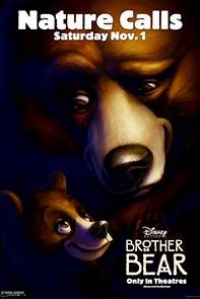
Brother Bear is a 2003 Academy Award nominated traditionally-animated feature produced by Walt Disney Feature Animation and released by Walt Disney Pictures on November 1, 2003, the forty-third animated feature in the Disney animated features canon. In the film, an Inuit boy pursues a bear in revenge for a battle that he provoked in which his oldest brother is killed. He tracks down the bear and kills it, but the Spirits, angered by this needless death, change the boy into a bear himself as punishment. Originally titled Bears, it was the third and final Disney animated feature produced primarily by the Feature Animation studio at Disney-MGM Studios in Orlando, Florida; the studio was shut down in March 2004, not long after the release of this film in favor of computer animated features. A direct-to-video sequel, Brother Bear 2, followed in 2006.
Andrew Lloyd Webber

Andrew Lloyd Webber, Baron Lloyd-Webber (born 22 March 1948) is an English composer of musical theatre, the elder son of organist William Lloyd Webber and brother of the cellist Julian Lloyd Webber. Lloyd Webber started composing at the age of six, and published his first piece at the age of nine.
Lloyd Webber has achieved great popular success, with several musicals that have run for more than a decade both in the West End and on Broadway. He has composed 13 musicals, a song cycle, a set of variations, two film scores, and a Latin Requiem Mass. He has also gained a number of honours, including a knighthood in 1992, followed by a peerage from the British Government for services to Music, seven Tony Awards (and 40 nominations), three Grammy Awards (with an additional 60 nominations), an Academy Award (two other nominations), seven Olivier Awards (with 100 nominations), a Golden Globe, and the Kennedy Center Honors in 2006. Several of his songs, notably "The Music of the Night" from The Phantom of the Opera, "I Don't Know How to Love Him" from Jesus Christ Superstar, "Don't Cry for Me, Argentina" from Evita, "Any Dream Will Do" from Joseph and the Amazing Technicolor Dreamcoat and "Memory" from Cats have been widely recorded and were hits outside of their parent musicals. His company, the Really Useful Group, is one of the largest theatre operators in London.
Producers in several parts of the UK have staged productions, including national tours, of Lloyd Webber's musicals under licence from the Really Useful Group. According to britishhitsongwriters.com, he is the one hundredth most successful songwriter in U.K. singles chart history, based on weeks that his compositions have spent on the chart.
Lloyd Webber has achieved great popular success, with several musicals that have run for more than a decade both in the West End and on Broadway. He has composed 13 musicals, a song cycle, a set of variations, two film scores, and a Latin Requiem Mass. He has also gained a number of honours, including a knighthood in 1992, followed by a peerage from the British Government for services to Music, seven Tony Awards (and 40 nominations), three Grammy Awards (with an additional 60 nominations), an Academy Award (two other nominations), seven Olivier Awards (with 100 nominations), a Golden Globe, and the Kennedy Center Honors in 2006. Several of his songs, notably "The Music of the Night" from The Phantom of the Opera, "I Don't Know How to Love Him" from Jesus Christ Superstar, "Don't Cry for Me, Argentina" from Evita, "Any Dream Will Do" from Joseph and the Amazing Technicolor Dreamcoat and "Memory" from Cats have been widely recorded and were hits outside of their parent musicals. His company, the Really Useful Group, is one of the largest theatre operators in London.
Producers in several parts of the UK have staged productions, including national tours, of Lloyd Webber's musicals under licence from the Really Useful Group. According to britishhitsongwriters.com, he is the one hundredth most successful songwriter in U.K. singles chart history, based on weeks that his compositions have spent on the chart.
Paul Simon
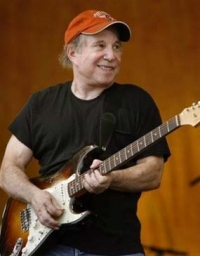
Paul Frederic Simon (born October 13, 1941) is an American songwriter, musician, and member of the Rock and Roll Hall of Fame. In 2006, Time magazine called him one of the 100 "people who shape our world." As of 2007, he resides in New Canaan, Connecticut.
He released Paul Simon in 1972, which contained one of his first experiments with world music, the Jamaican-inspired Mother and Child Reunion, and There Goes Rhymin' Simon in 1973. His 1975 album Still Crazy After All These Years is considered to be among his finest work, particularly the title track and the hit single "50 Ways to Leave Your Lover." The One Trick Pony album, Simon's first album with Warner Bros. Records was also paired with a major motion picture of the same name, with Simon in the starring role. Simon's next album Hearts and Bones, while critically acclaimed, did not yield any hit singles and marked a lull in his commercial popularity in the early 1980s.
In 1985, Simon lent his talents to USA for Africa and performed on the famine relief fundraising single "We Are the World". In 1986 he released the immensely popular Graceland, for which he won a Grammy. The album featured the groundbreaking use of African rhythms and performers such as Ladysmith Black Mambazo. In 1990, he followed up Graceland with the commercially successful and consistent successor album The Rhythm of the Saints, which featured Brazilian musical themes.
His 2000 studio album You're the One, did not reach the commercial heights of previous albums but was considered by many fans and critics to be an artistic success and received a Grammy nomination for Album of the Year. Simon's latest album, Surprise, produced by himself and Brian Eno, was released on May 9, 2006. In commenting on US TV show Ellen what drove him to write material for this latest album, Simon noted the events of September 11, 2001 and also turning 60 since his previous album You're the One.
He released Paul Simon in 1972, which contained one of his first experiments with world music, the Jamaican-inspired Mother and Child Reunion, and There Goes Rhymin' Simon in 1973. His 1975 album Still Crazy After All These Years is considered to be among his finest work, particularly the title track and the hit single "50 Ways to Leave Your Lover." The One Trick Pony album, Simon's first album with Warner Bros. Records was also paired with a major motion picture of the same name, with Simon in the starring role. Simon's next album Hearts and Bones, while critically acclaimed, did not yield any hit singles and marked a lull in his commercial popularity in the early 1980s.
In 1985, Simon lent his talents to USA for Africa and performed on the famine relief fundraising single "We Are the World". In 1986 he released the immensely popular Graceland, for which he won a Grammy. The album featured the groundbreaking use of African rhythms and performers such as Ladysmith Black Mambazo. In 1990, he followed up Graceland with the commercially successful and consistent successor album The Rhythm of the Saints, which featured Brazilian musical themes.
His 2000 studio album You're the One, did not reach the commercial heights of previous albums but was considered by many fans and critics to be an artistic success and received a Grammy nomination for Album of the Year. Simon's latest album, Surprise, produced by himself and Brian Eno, was released on May 9, 2006. In commenting on US TV show Ellen what drove him to write material for this latest album, Simon noted the events of September 11, 2001 and also turning 60 since his previous album You're the One.
Willie Nelson
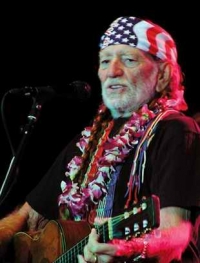
Willie Hugh Nelson (born April 29, 1933) is an American musician, actor, and activist. The critical success of the album Shotgun Willie (1973), combined with the critical and commercial success of Red Headed Stranger (1975) and Stardust (1978), made Nelson one of the most recognized artists in country music. He was one of the main figures of outlaw country, a subgenre of country music that developed in the late 1960s as a reaction to the conservative restrictions of the Nashville sound.
Vivaldi

Antonio Lucio Vivaldi (March 4, 1678 â July 28, 1741), nicknamed il Prete Rosso ("The Red Priest"), was a Venetian priest and Baroque music composer, as well as a famous virtuoso violinist; he was born and raised in the Republic of Venice. The Four Seasons, a series of four violin concerti, is his best-known work and a highly popular Baroque piece.
Many of Vivaldi's compositions reflect a flamboyant, almost playful, exuberance. Most of Vivaldi's repertoire was rediscovered only in the first half of the 20th century in Turin and Genoa and was published in the second half. Vivaldi's music is innovative, breaking a consolidated tradition in schemes; he gave brightness to the formal and the rhythmic structure of the concerto, repeatedly looking for harmonic contrasts and innovative melodies and themes. Moreover, Vivaldi was able to compose nonacademic music, particularly meant to be appreciated by the wide public and not only by an intellectual minority. The joyful appearance of his music reveals in this regard a transmissible joy of composing; these are among the causes of the vast popularity of his music. This popularity soon made him famous in other countries such as France which was, at the time, very independent concerning its musical taste.
Vivaldi is considered one of the composers who brought Baroque music (with its typical contrast among heavy sonorities) to evolve into a classical style. Johann Sebastian Bach was deeply influenced by Vivaldi's concertos and arias (recalled in his Johannes Passion, Matthäuspassion, and cantatas). Bach transcribed a number of Vivaldi's concerti for solo keyboard, along with a number for orchestra, including the famous Concerto for Four Violins and Violoncello, Strings and Continuo (RV 580).
Many of Vivaldi's compositions reflect a flamboyant, almost playful, exuberance. Most of Vivaldi's repertoire was rediscovered only in the first half of the 20th century in Turin and Genoa and was published in the second half. Vivaldi's music is innovative, breaking a consolidated tradition in schemes; he gave brightness to the formal and the rhythmic structure of the concerto, repeatedly looking for harmonic contrasts and innovative melodies and themes. Moreover, Vivaldi was able to compose nonacademic music, particularly meant to be appreciated by the wide public and not only by an intellectual minority. The joyful appearance of his music reveals in this regard a transmissible joy of composing; these are among the causes of the vast popularity of his music. This popularity soon made him famous in other countries such as France which was, at the time, very independent concerning its musical taste.
Vivaldi is considered one of the composers who brought Baroque music (with its typical contrast among heavy sonorities) to evolve into a classical style. Johann Sebastian Bach was deeply influenced by Vivaldi's concertos and arias (recalled in his Johannes Passion, Matthäuspassion, and cantatas). Bach transcribed a number of Vivaldi's concerti for solo keyboard, along with a number for orchestra, including the famous Concerto for Four Violins and Violoncello, Strings and Continuo (RV 580).
Athur Laurent
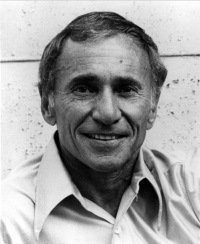
Arthur Laurents (July 14, 1917 – May 5, 2011) was an American playwright, stage director and screenwriter.
After writing scripts for radio shows after college and then training films for the U.S. Army during World War II, Laurents turned to writing for Broadway, producing a body of work that includes West Side Story (1957), Gypsy (1959), and Hallelujah, Baby! (1967), and directing some of his own shows and other Broadway productions.
His early film scripts include Rope (1948) for Alfred Hitchcock, followed by Anastasia (1956), Bonjour Tristesse (1958), The Way We Were (1973), and The Turning Point (1977).
Contents
1 Early life
2 Theatrical career
3 Film career
4 Blacklist
5 Memoirs
6 Death
7 Work
7.1 Writing
7.2 Directing
7.3 Additional credits
8 Awards, nominations and honors
9 See also
10 References
11 Further reading
12 External links
Early life
Born Arthur Levine, Laurents was the son of middle-class Jewish parents, a lawyer and a schoolteacher who gave up her career when she married. He was born and raised in the Flatbush section of Brooklyn, a borough of New York City, New York, the elder of two children, and attended Erasmus Hall High School. His sister Edith suffered from chorea as a child.
His paternal grandparents were Orthodox Jews, and his mother's parents, although born Jewish, were atheists. His mother kept a kosher home for her husband's sake, but was lax about attending synagogue and observing the Jewish holidays. His Bar Mitzvah marked the end of Laurents's religious education and the beginning of his rejection of all fundamentalist religions, although he continued to identify himself as Jewish. However, late in life he admitted to having changed his last name from Levine to the less Jewish-sounding Laurents, "to get a job."
After graduating from Cornell University, Laurents took an evening class in radio writing at New York University. William N. Robson, his instructor, a CBS Radio director/producer, submitted his script Now Playing Tomorrow, a comedic fantasy about clairvoyance, to the network, and it was produced in the Columbia Workshop series on January 30, 1939, with Shirley Booth in the lead role. It was Laurents' first professional credit. The show's success led to him being hired to write scripts for various radio shows, among them Lux Radio Theater. Laurents' career was interrupted when he was drafted into the U.S. Army in the middle of World War II. Through a series of clerical errors, he never saw battle, but instead was assigned to the U.S. Army Pictorial Service located in a film studio in Astoria, Queens, where he wrote training films and met, among others, George Cukor and William Holden. He later was reassigned to write plays for Armed Service Force Presents, a radio show that dramatized the contributions of all branches of the armed forces.
Theatrical career
According to John Clum, "Laurents was always a mirror of his times. Through his best work, one sees a staged history of leftist, gender, and gay politics in the decades after World War II." After graduating from Cornell University in 1937, Laurents went to work as a writer for radio drama at CBS in New York. His military duties during World War II, which consisted of writing training films and radio scripts for Armed Service Force Presents, brought him into contact with some of the best film directors—distinguished director George Cukor directed his first script. Laurents's work in radio and film during World War II was an excellent apprenticeship for a budding playwright and screenwriter. He also had the good fortune to be based in New York City. His first stage play, Home of the Brave, was produced in 1945. The sale of the play to a film studio gave Laurents the entrée he needed to become a Hollywood screenwriter though he continued, with mixed success, to write plays. The most important of his early screenplays is his adaptation of Rope for Alfred Hitchcock.
Soon after being discharged from the Army, Laurents met ballerina Nora Kaye, and the two became involved in an on-again, off-again romantic relationship. While Kaye was on tour with Fancy Free, Laurents continued to write for the radio but was becoming discontented with the medium. At the urging of Martin Gabel, he spent nine consecutive nights writing a play In 1962, Laurents directed I Can Get It for You Wholesale, which helped to turn then-unknown Barbra Streisand into a star. His next project was the stage musical Anyone Can Whistle, which he directed and for which he wrote the book, but it proved to be an infamous flop. He later had success with the musicals Hallelujah, Baby! (written for Lena Horne but ultimately starring Leslie Uggams) and La Cage Aux Folles (1983), which he directed, however Nick & Nora was not successful.
In 2008, Laurents directed a Broadway revival of Gypsy starring Patti LuPone, and in 2009, he tackled a bilingual revival of West Side Story, with Spanish translations of some dialogue and lyrics by Lin-Manuel Miranda. While preparing West Side Story, he noted, "The musical theatre and cultural conventions of 1957 made it next to impossible for the characters to have authenticity." Following the production's March 19 opening at the Palace Theatre, Ben Brantley of The New York Times called the translations "an only partly successful experiment" and added, "Mr. Laurents has exchanged insolence for innocence and, as with most such bargains, there are dividends and losses." The national tour (2011-2012) was directed by David Saint, who was Laurents' assistant director on the Broadway production. The Spanish lyrics and dialog were reduced from about 18% of the total to about 10%.
Film career
Laurents' first Hollywood experience proved to be a frustrating disappointment. Director Anatole Litvak, unhappy with the script submitted by Frank Partos and Millen Brand for The Snake Pit (1948), hired Laurents to rewrite it. Partos and Brand later insisted the bulk of the shooting script was theirs, and produced carbon copies of many of the pages Laurents actually had written to bolster their claim. Having destroyed the original script and all his notes and rewritten pages after completing the project, Laurents had no way to prove most of the work was his, and the Writers Guild of America denied him screen credit. Brand later confessed he and Partos had copied scenes written by Laurents and apologized for his role in the deception. Four decades later, Laurents learned he was ineligible for WGA health benefits because he had failed to accumulate enough credits to qualify. He was short by one, the one he failed to get for The Snake Pit.
Upon hearing 20th Century Fox executives were pleased with Laurents' work on The Snake Pit, Alfred Hitchcock hired him for his next project, the film Rope starring James Stewart. Hitchcock wanted Laurents to Americanize the British play Rope (1929) by Patrick Hamilton for the screen. With his then-lover Farley Granger set to star, Laurents was happy to accept the assignment. His dilemma was how to make the audience aware of the fact the three main characters were homosexual without blatantly saying so. The Hays Office kept close tabs on his work, and the final script was so discreet that Laurents was unsure whether co-star James Stewart ever realized that his character was gay. In later years, Hitchcock asked him to script both Torn Curtain (1966) and Topaz (1969), However, Laurents, in both cases unenthused by the material, declined the offers.
Laurents also scripted Anastasia (1956) and Bonjour Tristesse (1958). The Way We Were (1973), in which he incorporated many of his own experiences, particularly those with the HUAC, reunited him with Barbra Streisand, and The Turning Point (1977), inspired in part by his love for Nora Kaye, was directed by her husband Herbert Ross. The Fox animated feature film Anastasia (1997) was based in part from his screenplay of the live-action 1956 film of the same title.
Blacklist
Because of a casual remark made by Russel Crouse, Laurents was called to Washington, D.C., to account for his political views. He explained himself to the House Un-American Activities Committee, and his appearance had no obvious impact on his career, which at the time was primarily in the theatre. When the McCarran Internal Security Act, which prohibited individuals suspected of engaging in subversive activities from obtaining a passport, was passed in 1950, Laurents and Granger immediately applied for and received passports and departed for Paris with Harold Clurman and his wife Stella Adler. Laurents and Granger remained abroad, traveling throughout Europe and northern Africa, for about 18 months.
Years earlier, Laurents and Jerome Robbins had developed Look Ma, I'm Dancin'! (1948), a stage musical about the world of ballet that ran for 188 performances on Broadway, and starred Nancy Walker and Harold Lang. (Although the musical was ultimately produced with a book by Jerome Lawrence and Robert E. Lee, as Laurents left the project.) Robbins approached Paramount Pictures about directing a screen version, and the studio agreed as long as Laurents was not part of the package.
It was not until then that Laurents learned he officially had been blacklisted, primarily because a review of Home of the Brave had been published in the Daily Worker. He decided to return to Paris, but the State Department refused to renew his passport. Laurents spent three months trying to clear his name, and after submitting a lengthy letter explaining his political beliefs in detail, it was determined they were so idiosyncratic he could not have been a member of any subversive groups. Within a week his passport was renewed, and the following day he sailed for Europe on the Ile de France. While on board, he received a cable from Metro-Goldwyn-Mayer offering him a screenwriting assignment. The blacklist had ended.
Memoirs
Laurents wrote Original Story By Arthur Laurents: A Memoir of Broadway and Hollywood, published in 2000. In it, he discusses his lengthy career and his many gay affairs and long-term relationships, including those with Farley Granger and Tom Hatcher (August 24, 1929 - October 26, 2006). Hatcher was an aspiring actor whom Gore Vidal suggested Laurents seek out at the Beverly Hills men's clothing store Hatcher was managing at the time. The couple remained together for 52 years until Hatcher's death on October 26, 2006.
Laurents wrote Mainly on Directing: Gypsy, West Side Story and Other Musicals, published in 2009, in which he discussed musicals he directed and the work of other directors he admired.
His last memoir titled The Rest of the Story was published posthumously in September 2012.
Death
Laurents died at the age of 93 at his home in Manhattan on May 5, 2011 of pneumonia complications, as reported by The New York Times. Following a long tradition, Broadway theatre lights were dimmed at 8 p.m. on May 6, 2011, for one minute in his memory. His ashes were buried alongside those of Tom Hatcher in a memorial bench in Quogue, Long Island, New York.
Work
Writing
Musicals
West Side Story – 1957 – Tony Nomination for Best Musical
Gypsy – 1959 – Tony Nomination for Best Musical
Anyone Can Whistle – 1964
Do I Hear a Waltz? – 1965
Hallelujah, Baby! – 1967 – Tony Award for Best Musical
The Madwoman of Central Park West – 1979
Nick & Nora – 1991
Novel
The Turning Point – 1977; New American Library (New York City); OCLC 11014907
Plays
Home of the Brave – 1945
The Bird Cage – 1950
The Time of the Cuckoo – 1952
A Clearing in the Woods – 1957
Invitation to a March – 1960
Directing
Invitation to a March – 1960
I Can Get It for You Wholesale – 1962
Anyone Can Whistle – 1964
Gypsy – 1974 – Tony Nomination for Best Direction of a Musical
The Madwoman of Central Park West – 1979
La Cage aux Folles – 1983 – Tony Award for Best Direction of a Musical
Nick & Nora – 1991
Gypsy – 2008 – Tony Award nomination as Best Director of a Musical
West Side Story – 2009 Broadway Revival
Additional credits
Anna Lucasta (screenwriter)
A Clearing in the Woods (playwright)
Invitation to a March (playwright, director)
The Madwoman of Central Park West (playwright, director)
My Good Name (playwright)
Jolson Sings Again (playwright)
The Enclave (playwright, director)
Radical Mystique (playwright, director)
Big Potato (playwright)
Two Lives (playwright)
My Good Name (playwright)
Claudia Lazlo (playwright)
Attacks on the Heart (playwright)
2 Lives (playwright)
New Year's Eve (playwright)
Come Back, Come Back, Wherever You Are (playwright, director)
Caught (screenwriter)
Rope (screenwriter)
Awards, nominations and honors
A new award was established in 2010, The Laurents/Hatcher Foundation Award. This is awarded annually "for an un-produced, full-length play of social relevance by an emerging American playwright." The Laurents/Hatcher Foundation will give $50,000 to the writer with a grant of $100,000 towards production costs at a nonprofit theatre. The first award will be given in 2011.
Theatre
1958 Tony Award for Best Musical (West Side Story, nominee)
1960 Tony Award for Best Musical (Gypsy, nominee)
1968 Tony Award for Best Musical (Hallelujah, Baby!, winner)
1975 Drama Desk Award for Outstanding Director of a Musical (Gypsy, winner)
1975 Tony Award for Best Direction of a Musical (Gypsy, nominee)
1984 Tony Award for Best Direction of a Musical (La Cage aux Folles, winner)
2008 Tony Award for Best Direction of a Musical (Gypsy, nominee)
Film
Academy Award for Best Picture (The Turning Point, nominee)
Academy Award for Best Original Screenplay (The Turning Point, nominee)
Edgar Allan Poe Award for Best Motion Picture Screenplay (Rope, nominee)
Golden Globe Award for Best Screenplay (The Turning Point, nominee)
Writers Guild of America Award for Best Original Screenplay (The Way We Were, nominee; The Turning Point, winner)
National Board of Review Award for Career Achievement (winner)
See also
Biography portal
Film portal
Musical Theatre portal
icon Theatre portal
icon Writing portal
List of Jewish American playwrights
List of novelists from the United States
List of pneumonia victims
List of people from Brooklyn, New York
List of playwrights from the United States
List of theatre directors
References
"Legendary Writer & Director Arthur Laurents Dies at 93". Broadway World. Retrieved May 6, 2011.
John M. Clum. The Works of Arthur Laurents: Politics, Love, and Betrayal. Amherst, NY: Cambria Press, 2014.
"Obituaries: Arthur Laurents". The Daily Telegraph. May 6, 2011.
"When You’re a Shark You’re a Shark All the Way". New York.
Hawtree, Christopher (May 6, 2011). "Arthur Laurents obituary: Playwright and screenwriter who wrote the book for West Side Story". The Guardian. Retrieved 6 August 2012.
Hutchinson, Bill (May 6, 2011). "Playwright Behind 'West Side Story' and 'Gypsy,' Arthur Laurents, Dies at Age 93". Daily News.
Arnold, Laurence (May 5, 2011). "Arthur Laurents, Writer of 'West Side Story,' 'Gypsy' Scripts, Dies at 93". Bloomberg News.
Laurents, Arthur. "Beginnings" Original Story By Arthur Laurents: A Memoir of Broadway and Hollywood, Hal Leonard Corporation, 2001, ISBN 1-55783-467-9, pp. 10–11, 34–35.
Laurents, Arthur. Original Story By. New York: Alfred A. Knopf (2000). ISBN 0-375-40055-9, pp. 6–7.
Laurents, p. 133.
Laurents, pp. 12–13.
Laurents, pp. 22–28.
Clum, John, "The Works of Arthur Laurents: Politics, Love, and Betrayal", November 2014, Cambria Press, ISBN 1604978848
Clum, John, "The Works of Arthur Laurents: Politics, Love, and Betrayal"
Laurents, p. 93.
Jones, Kenneth (July 16, 2008). "'West Side Story', This Time With Bilingual Approach, Will Return to Broadway in February 2009". Playbill.
Brantley, Ben (March 20, 2009). "Our Gangs". The New York Times.
Berson, M. (January 8, 2012). "'West Side Story': A classic revived" Archived January 12, 2012, at the Wayback Machine. Seattle Times.
Laurents, pp. 106–120.
Laurents, pp. 115–116, 124–131.
Laurents, p. 136.
""West Side Story Author Arthur Laurents Dies, 93" Archived July 9, 2012, at Archive.today forum.bcdb.com. May 4, 2011.
Laurents, p. 29.
Laurents, pp. 165–190.
Vaill, Amanda (2006). Somewhere: The Life of Jerome Robbins, Random House, Inc. p. 135. ISBN 0-7679-0420-6.
"'Look Ma, I'm Dancin' listing". Internet Broadway Database.
Laurents, pp. 286–289.
"Backstage.com obituary, November 1, 2006". Backstage.
Berkvist, Robert (May 5, 2011). "Arthur Laurents, Playwright and Director on Broadway, Dies at 93". The New York Times.
Jones, Kenneth (May 6, 2011). "Broadway Lights Will Dim May 6 in Memory of Arthur Laurents" Archived October 21, 2012, at the Wayback Machine. Playbill.
Gans, Andrew (June 3, 2010). "New Award Named for Arthur Laurents and His Partner, the Late Tom Hatcher" Archived June 5, 2010, at the Wayback Machine. Playbill.
Further reading
Laurents, Arthur (2000). Original Story by Arthur Laurents: A Memoir of Broadway and Hollywood. New York: Knopf. ISBN 0-375-40055-9.
Laurents, Arthur (2009). Mainly on Directing: Gypsy, West Side Story, and Other Musicals. New York: Knopf. ISBN 0-307-27088-2.
Clum, John (2014). The Works of Arthur Laurents: Politics, Love, and Betrayal. Amherst, NY: Cambria Press. ISBN 978-1-60497-884-1.
External links
Arthur Laurents at the Internet Broadway Database Edit this at Wikidata
Arthur Laurents at the Internet Off-Broadway Database
Arthur Laurents on IMDb
American Theatre Wing biography
Works by or about Arthur Laurents in libraries (WorldCat catalog)
Works by Arthur Laurents at Open Library Edit this at Wikidata
vte
Works by Arthur Laurents
Writer
Musicals
West Side Story (1957) Gypsy (1959) Anyone Can Whistle (1964) Do I Hear a Waltz? (1965) Hallelujah, Baby! (1967) The Madwoman of Central Park West (1979) Nick & Nora (1991)
Plays
Home of the Brave (1945) The Time of the Cuckoo (1952)
Films
Rope (1948) Caught (1949) Anastasia (1956) Bonjour Tristesse (1958) The Way We Were (1973) The Turning Point (1977)
Director
I Can Get It for You Wholesale (1962) Anyone Can Whistle (1964) Gypsy (1974) The Madwoman of Central Park West (1979) La Cage aux Folles (1983) Birds of Paradise (1987) Gypsy (1989) Nick & Nora (1991) Gypsy (2008) West Side Story (2009)
Awards for Arthur Laurents
vte
Arthur Laurents, Leonard Bernstein and Stephen Sondheim's West Side Story (1957)
Characters
Maria
Inspiration
William Shakespeare's Romeo and Juliet
Adaptations
West Side Story (1961 film) West Side Story Suite (1995 ballet) West Side Story (2020 film)
Variations
Deaf Side Story (c. 2002 musical) Swango (2002 musical) West Bank Story (2005 parody film)
Songs
Act 1
"Something's Coming" "Maria" "Tonight" "America" "Cool" "One Hand, One Heart" "Tonight (Quintet & Chorus)"
Act 2
"I Feel Pretty" "Somewhere" "Gee, Officer Krupke" "A Boy Like That"
Albums
West Side Story (1957 original cast) West Side Story (1959 Previn) West Side Story (1961 soundtrack) West Side Story (1961 Tjader) Bernstein Plays Brubeck Plays Bernstein (1961 Brubeck Quartet) West Side Story (1962 Peterson Trio) Kenton's West Side Story (1962 Kenton) Toshiko–Mariano Quartet (in West Side) (1963 Akiyoshi) West Side Story (1974 Earl Hines)
Related
"The First Time" "Upper West Side Story" Wild Side Story China Girl "Roses" Play It Again Josh Superjail!
Authority control Edit this at Wikidata
BNE: XX1122852 BNF: cb140368976 (data) GND: 123286352 ISNI: 0000 0001 1025 0247 LCCN: n85173003 MusicBrainz: e062e9c9-5fd4-4384-ba1d-71495ce3bb7d NKC: xx0026607 NTA: 071341080 SNAC: w6gf56zk SUDOC: 058478094 VIAF: 37116781 WorldCat Identities (via VIAF): 37116781
Categories: 1917 births2011 deathsAmerican memoiristsAmerican musical theatre librettistsAmerican people of World War IIAmerican male screenwritersCornell University alumniDeaths from pneumoniaDrama Desk Award winnersErasmus Hall High School alumniGay writersHollywood blacklistInfectious disease deaths in New York (state)Jewish American novelistsLGBT JewsLGBT memoiristsLGBT writers from the United StatesPeople from Flatbush, BrooklynUnited States Army personnelWriters from New York CityJewish American dramatists and playwrightsAnalysands of Theodor ReikLGBT dramatists and playwrightsLGBT novelistsGolden Globe Award-winning producersAmerican male novelistsLGBT screenwritersLGBT people from New York (state)Tony Award winnersAmerican male dramatists and playwrights20th-century American novelists20th-century American dramatists and playwrightsNovelists from New York (state)20th-century American non-fiction writersAmerican male non-fiction writersScreenwriters from New York (state)American Theater Hall of Fame inductees
After writing scripts for radio shows after college and then training films for the U.S. Army during World War II, Laurents turned to writing for Broadway, producing a body of work that includes West Side Story (1957), Gypsy (1959), and Hallelujah, Baby! (1967), and directing some of his own shows and other Broadway productions.
His early film scripts include Rope (1948) for Alfred Hitchcock, followed by Anastasia (1956), Bonjour Tristesse (1958), The Way We Were (1973), and The Turning Point (1977).
Contents
1 Early life
2 Theatrical career
3 Film career
4 Blacklist
5 Memoirs
6 Death
7 Work
7.1 Writing
7.2 Directing
7.3 Additional credits
8 Awards, nominations and honors
9 See also
10 References
11 Further reading
12 External links
Early life
Born Arthur Levine, Laurents was the son of middle-class Jewish parents, a lawyer and a schoolteacher who gave up her career when she married. He was born and raised in the Flatbush section of Brooklyn, a borough of New York City, New York, the elder of two children, and attended Erasmus Hall High School. His sister Edith suffered from chorea as a child.
His paternal grandparents were Orthodox Jews, and his mother's parents, although born Jewish, were atheists. His mother kept a kosher home for her husband's sake, but was lax about attending synagogue and observing the Jewish holidays. His Bar Mitzvah marked the end of Laurents's religious education and the beginning of his rejection of all fundamentalist religions, although he continued to identify himself as Jewish. However, late in life he admitted to having changed his last name from Levine to the less Jewish-sounding Laurents, "to get a job."
After graduating from Cornell University, Laurents took an evening class in radio writing at New York University. William N. Robson, his instructor, a CBS Radio director/producer, submitted his script Now Playing Tomorrow, a comedic fantasy about clairvoyance, to the network, and it was produced in the Columbia Workshop series on January 30, 1939, with Shirley Booth in the lead role. It was Laurents' first professional credit. The show's success led to him being hired to write scripts for various radio shows, among them Lux Radio Theater. Laurents' career was interrupted when he was drafted into the U.S. Army in the middle of World War II. Through a series of clerical errors, he never saw battle, but instead was assigned to the U.S. Army Pictorial Service located in a film studio in Astoria, Queens, where he wrote training films and met, among others, George Cukor and William Holden. He later was reassigned to write plays for Armed Service Force Presents, a radio show that dramatized the contributions of all branches of the armed forces.
Theatrical career
According to John Clum, "Laurents was always a mirror of his times. Through his best work, one sees a staged history of leftist, gender, and gay politics in the decades after World War II." After graduating from Cornell University in 1937, Laurents went to work as a writer for radio drama at CBS in New York. His military duties during World War II, which consisted of writing training films and radio scripts for Armed Service Force Presents, brought him into contact with some of the best film directors—distinguished director George Cukor directed his first script. Laurents's work in radio and film during World War II was an excellent apprenticeship for a budding playwright and screenwriter. He also had the good fortune to be based in New York City. His first stage play, Home of the Brave, was produced in 1945. The sale of the play to a film studio gave Laurents the entrée he needed to become a Hollywood screenwriter though he continued, with mixed success, to write plays. The most important of his early screenplays is his adaptation of Rope for Alfred Hitchcock.
Soon after being discharged from the Army, Laurents met ballerina Nora Kaye, and the two became involved in an on-again, off-again romantic relationship. While Kaye was on tour with Fancy Free, Laurents continued to write for the radio but was becoming discontented with the medium. At the urging of Martin Gabel, he spent nine consecutive nights writing a play In 1962, Laurents directed I Can Get It for You Wholesale, which helped to turn then-unknown Barbra Streisand into a star. His next project was the stage musical Anyone Can Whistle, which he directed and for which he wrote the book, but it proved to be an infamous flop. He later had success with the musicals Hallelujah, Baby! (written for Lena Horne but ultimately starring Leslie Uggams) and La Cage Aux Folles (1983), which he directed, however Nick & Nora was not successful.
In 2008, Laurents directed a Broadway revival of Gypsy starring Patti LuPone, and in 2009, he tackled a bilingual revival of West Side Story, with Spanish translations of some dialogue and lyrics by Lin-Manuel Miranda. While preparing West Side Story, he noted, "The musical theatre and cultural conventions of 1957 made it next to impossible for the characters to have authenticity." Following the production's March 19 opening at the Palace Theatre, Ben Brantley of The New York Times called the translations "an only partly successful experiment" and added, "Mr. Laurents has exchanged insolence for innocence and, as with most such bargains, there are dividends and losses." The national tour (2011-2012) was directed by David Saint, who was Laurents' assistant director on the Broadway production. The Spanish lyrics and dialog were reduced from about 18% of the total to about 10%.
Film career
Laurents' first Hollywood experience proved to be a frustrating disappointment. Director Anatole Litvak, unhappy with the script submitted by Frank Partos and Millen Brand for The Snake Pit (1948), hired Laurents to rewrite it. Partos and Brand later insisted the bulk of the shooting script was theirs, and produced carbon copies of many of the pages Laurents actually had written to bolster their claim. Having destroyed the original script and all his notes and rewritten pages after completing the project, Laurents had no way to prove most of the work was his, and the Writers Guild of America denied him screen credit. Brand later confessed he and Partos had copied scenes written by Laurents and apologized for his role in the deception. Four decades later, Laurents learned he was ineligible for WGA health benefits because he had failed to accumulate enough credits to qualify. He was short by one, the one he failed to get for The Snake Pit.
Upon hearing 20th Century Fox executives were pleased with Laurents' work on The Snake Pit, Alfred Hitchcock hired him for his next project, the film Rope starring James Stewart. Hitchcock wanted Laurents to Americanize the British play Rope (1929) by Patrick Hamilton for the screen. With his then-lover Farley Granger set to star, Laurents was happy to accept the assignment. His dilemma was how to make the audience aware of the fact the three main characters were homosexual without blatantly saying so. The Hays Office kept close tabs on his work, and the final script was so discreet that Laurents was unsure whether co-star James Stewart ever realized that his character was gay. In later years, Hitchcock asked him to script both Torn Curtain (1966) and Topaz (1969), However, Laurents, in both cases unenthused by the material, declined the offers.
Laurents also scripted Anastasia (1956) and Bonjour Tristesse (1958). The Way We Were (1973), in which he incorporated many of his own experiences, particularly those with the HUAC, reunited him with Barbra Streisand, and The Turning Point (1977), inspired in part by his love for Nora Kaye, was directed by her husband Herbert Ross. The Fox animated feature film Anastasia (1997) was based in part from his screenplay of the live-action 1956 film of the same title.
Blacklist
Because of a casual remark made by Russel Crouse, Laurents was called to Washington, D.C., to account for his political views. He explained himself to the House Un-American Activities Committee, and his appearance had no obvious impact on his career, which at the time was primarily in the theatre. When the McCarran Internal Security Act, which prohibited individuals suspected of engaging in subversive activities from obtaining a passport, was passed in 1950, Laurents and Granger immediately applied for and received passports and departed for Paris with Harold Clurman and his wife Stella Adler. Laurents and Granger remained abroad, traveling throughout Europe and northern Africa, for about 18 months.
Years earlier, Laurents and Jerome Robbins had developed Look Ma, I'm Dancin'! (1948), a stage musical about the world of ballet that ran for 188 performances on Broadway, and starred Nancy Walker and Harold Lang. (Although the musical was ultimately produced with a book by Jerome Lawrence and Robert E. Lee, as Laurents left the project.) Robbins approached Paramount Pictures about directing a screen version, and the studio agreed as long as Laurents was not part of the package.
It was not until then that Laurents learned he officially had been blacklisted, primarily because a review of Home of the Brave had been published in the Daily Worker. He decided to return to Paris, but the State Department refused to renew his passport. Laurents spent three months trying to clear his name, and after submitting a lengthy letter explaining his political beliefs in detail, it was determined they were so idiosyncratic he could not have been a member of any subversive groups. Within a week his passport was renewed, and the following day he sailed for Europe on the Ile de France. While on board, he received a cable from Metro-Goldwyn-Mayer offering him a screenwriting assignment. The blacklist had ended.
Memoirs
Laurents wrote Original Story By Arthur Laurents: A Memoir of Broadway and Hollywood, published in 2000. In it, he discusses his lengthy career and his many gay affairs and long-term relationships, including those with Farley Granger and Tom Hatcher (August 24, 1929 - October 26, 2006). Hatcher was an aspiring actor whom Gore Vidal suggested Laurents seek out at the Beverly Hills men's clothing store Hatcher was managing at the time. The couple remained together for 52 years until Hatcher's death on October 26, 2006.
Laurents wrote Mainly on Directing: Gypsy, West Side Story and Other Musicals, published in 2009, in which he discussed musicals he directed and the work of other directors he admired.
His last memoir titled The Rest of the Story was published posthumously in September 2012.
Death
Laurents died at the age of 93 at his home in Manhattan on May 5, 2011 of pneumonia complications, as reported by The New York Times. Following a long tradition, Broadway theatre lights were dimmed at 8 p.m. on May 6, 2011, for one minute in his memory. His ashes were buried alongside those of Tom Hatcher in a memorial bench in Quogue, Long Island, New York.
Work
Writing
Musicals
West Side Story – 1957 – Tony Nomination for Best Musical
Gypsy – 1959 – Tony Nomination for Best Musical
Anyone Can Whistle – 1964
Do I Hear a Waltz? – 1965
Hallelujah, Baby! – 1967 – Tony Award for Best Musical
The Madwoman of Central Park West – 1979
Nick & Nora – 1991
Novel
The Turning Point – 1977; New American Library (New York City); OCLC 11014907
Plays
Home of the Brave – 1945
The Bird Cage – 1950
The Time of the Cuckoo – 1952
A Clearing in the Woods – 1957
Invitation to a March – 1960
Directing
Invitation to a March – 1960
I Can Get It for You Wholesale – 1962
Anyone Can Whistle – 1964
Gypsy – 1974 – Tony Nomination for Best Direction of a Musical
The Madwoman of Central Park West – 1979
La Cage aux Folles – 1983 – Tony Award for Best Direction of a Musical
Nick & Nora – 1991
Gypsy – 2008 – Tony Award nomination as Best Director of a Musical
West Side Story – 2009 Broadway Revival
Additional credits
Anna Lucasta (screenwriter)
A Clearing in the Woods (playwright)
Invitation to a March (playwright, director)
The Madwoman of Central Park West (playwright, director)
My Good Name (playwright)
Jolson Sings Again (playwright)
The Enclave (playwright, director)
Radical Mystique (playwright, director)
Big Potato (playwright)
Two Lives (playwright)
My Good Name (playwright)
Claudia Lazlo (playwright)
Attacks on the Heart (playwright)
2 Lives (playwright)
New Year's Eve (playwright)
Come Back, Come Back, Wherever You Are (playwright, director)
Caught (screenwriter)
Rope (screenwriter)
Awards, nominations and honors
A new award was established in 2010, The Laurents/Hatcher Foundation Award. This is awarded annually "for an un-produced, full-length play of social relevance by an emerging American playwright." The Laurents/Hatcher Foundation will give $50,000 to the writer with a grant of $100,000 towards production costs at a nonprofit theatre. The first award will be given in 2011.
Theatre
1958 Tony Award for Best Musical (West Side Story, nominee)
1960 Tony Award for Best Musical (Gypsy, nominee)
1968 Tony Award for Best Musical (Hallelujah, Baby!, winner)
1975 Drama Desk Award for Outstanding Director of a Musical (Gypsy, winner)
1975 Tony Award for Best Direction of a Musical (Gypsy, nominee)
1984 Tony Award for Best Direction of a Musical (La Cage aux Folles, winner)
2008 Tony Award for Best Direction of a Musical (Gypsy, nominee)
Film
Academy Award for Best Picture (The Turning Point, nominee)
Academy Award for Best Original Screenplay (The Turning Point, nominee)
Edgar Allan Poe Award for Best Motion Picture Screenplay (Rope, nominee)
Golden Globe Award for Best Screenplay (The Turning Point, nominee)
Writers Guild of America Award for Best Original Screenplay (The Way We Were, nominee; The Turning Point, winner)
National Board of Review Award for Career Achievement (winner)
See also
Biography portal
Film portal
Musical Theatre portal
icon Theatre portal
icon Writing portal
List of Jewish American playwrights
List of novelists from the United States
List of pneumonia victims
List of people from Brooklyn, New York
List of playwrights from the United States
List of theatre directors
References
"Legendary Writer & Director Arthur Laurents Dies at 93". Broadway World. Retrieved May 6, 2011.
John M. Clum. The Works of Arthur Laurents: Politics, Love, and Betrayal. Amherst, NY: Cambria Press, 2014.
"Obituaries: Arthur Laurents". The Daily Telegraph. May 6, 2011.
"When You’re a Shark You’re a Shark All the Way". New York.
Hawtree, Christopher (May 6, 2011). "Arthur Laurents obituary: Playwright and screenwriter who wrote the book for West Side Story". The Guardian. Retrieved 6 August 2012.
Hutchinson, Bill (May 6, 2011). "Playwright Behind 'West Side Story' and 'Gypsy,' Arthur Laurents, Dies at Age 93". Daily News.
Arnold, Laurence (May 5, 2011). "Arthur Laurents, Writer of 'West Side Story,' 'Gypsy' Scripts, Dies at 93". Bloomberg News.
Laurents, Arthur. "Beginnings" Original Story By Arthur Laurents: A Memoir of Broadway and Hollywood, Hal Leonard Corporation, 2001, ISBN 1-55783-467-9, pp. 10–11, 34–35.
Laurents, Arthur. Original Story By. New York: Alfred A. Knopf (2000). ISBN 0-375-40055-9, pp. 6–7.
Laurents, p. 133.
Laurents, pp. 12–13.
Laurents, pp. 22–28.
Clum, John, "The Works of Arthur Laurents: Politics, Love, and Betrayal", November 2014, Cambria Press, ISBN 1604978848
Clum, John, "The Works of Arthur Laurents: Politics, Love, and Betrayal"
Laurents, p. 93.
Jones, Kenneth (July 16, 2008). "'West Side Story', This Time With Bilingual Approach, Will Return to Broadway in February 2009". Playbill.
Brantley, Ben (March 20, 2009). "Our Gangs". The New York Times.
Berson, M. (January 8, 2012). "'West Side Story': A classic revived" Archived January 12, 2012, at the Wayback Machine. Seattle Times.
Laurents, pp. 106–120.
Laurents, pp. 115–116, 124–131.
Laurents, p. 136.
""West Side Story Author Arthur Laurents Dies, 93" Archived July 9, 2012, at Archive.today forum.bcdb.com. May 4, 2011.
Laurents, p. 29.
Laurents, pp. 165–190.
Vaill, Amanda (2006). Somewhere: The Life of Jerome Robbins, Random House, Inc. p. 135. ISBN 0-7679-0420-6.
"'Look Ma, I'm Dancin' listing". Internet Broadway Database.
Laurents, pp. 286–289.
"Backstage.com obituary, November 1, 2006". Backstage.
Berkvist, Robert (May 5, 2011). "Arthur Laurents, Playwright and Director on Broadway, Dies at 93". The New York Times.
Jones, Kenneth (May 6, 2011). "Broadway Lights Will Dim May 6 in Memory of Arthur Laurents" Archived October 21, 2012, at the Wayback Machine. Playbill.
Gans, Andrew (June 3, 2010). "New Award Named for Arthur Laurents and His Partner, the Late Tom Hatcher" Archived June 5, 2010, at the Wayback Machine. Playbill.
Further reading
Laurents, Arthur (2000). Original Story by Arthur Laurents: A Memoir of Broadway and Hollywood. New York: Knopf. ISBN 0-375-40055-9.
Laurents, Arthur (2009). Mainly on Directing: Gypsy, West Side Story, and Other Musicals. New York: Knopf. ISBN 0-307-27088-2.
Clum, John (2014). The Works of Arthur Laurents: Politics, Love, and Betrayal. Amherst, NY: Cambria Press. ISBN 978-1-60497-884-1.
External links
Arthur Laurents at the Internet Broadway Database Edit this at Wikidata
Arthur Laurents at the Internet Off-Broadway Database
Arthur Laurents on IMDb
American Theatre Wing biography
Works by or about Arthur Laurents in libraries (WorldCat catalog)
Works by Arthur Laurents at Open Library Edit this at Wikidata
vte
Works by Arthur Laurents
Writer
Musicals
West Side Story (1957) Gypsy (1959) Anyone Can Whistle (1964) Do I Hear a Waltz? (1965) Hallelujah, Baby! (1967) The Madwoman of Central Park West (1979) Nick & Nora (1991)
Plays
Home of the Brave (1945) The Time of the Cuckoo (1952)
Films
Rope (1948) Caught (1949) Anastasia (1956) Bonjour Tristesse (1958) The Way We Were (1973) The Turning Point (1977)
Director
I Can Get It for You Wholesale (1962) Anyone Can Whistle (1964) Gypsy (1974) The Madwoman of Central Park West (1979) La Cage aux Folles (1983) Birds of Paradise (1987) Gypsy (1989) Nick & Nora (1991) Gypsy (2008) West Side Story (2009)
Awards for Arthur Laurents
vte
Arthur Laurents, Leonard Bernstein and Stephen Sondheim's West Side Story (1957)
Characters
Maria
Inspiration
William Shakespeare's Romeo and Juliet
Adaptations
West Side Story (1961 film) West Side Story Suite (1995 ballet) West Side Story (2020 film)
Variations
Deaf Side Story (c. 2002 musical) Swango (2002 musical) West Bank Story (2005 parody film)
Songs
Act 1
"Something's Coming" "Maria" "Tonight" "America" "Cool" "One Hand, One Heart" "Tonight (Quintet & Chorus)"
Act 2
"I Feel Pretty" "Somewhere" "Gee, Officer Krupke" "A Boy Like That"
Albums
West Side Story (1957 original cast) West Side Story (1959 Previn) West Side Story (1961 soundtrack) West Side Story (1961 Tjader) Bernstein Plays Brubeck Plays Bernstein (1961 Brubeck Quartet) West Side Story (1962 Peterson Trio) Kenton's West Side Story (1962 Kenton) Toshiko–Mariano Quartet (in West Side) (1963 Akiyoshi) West Side Story (1974 Earl Hines)
Related
"The First Time" "Upper West Side Story" Wild Side Story China Girl "Roses" Play It Again Josh Superjail!
Authority control Edit this at Wikidata
BNE: XX1122852 BNF: cb140368976 (data) GND: 123286352 ISNI: 0000 0001 1025 0247 LCCN: n85173003 MusicBrainz: e062e9c9-5fd4-4384-ba1d-71495ce3bb7d NKC: xx0026607 NTA: 071341080 SNAC: w6gf56zk SUDOC: 058478094 VIAF: 37116781 WorldCat Identities (via VIAF): 37116781
Categories: 1917 births2011 deathsAmerican memoiristsAmerican musical theatre librettistsAmerican people of World War IIAmerican male screenwritersCornell University alumniDeaths from pneumoniaDrama Desk Award winnersErasmus Hall High School alumniGay writersHollywood blacklistInfectious disease deaths in New York (state)Jewish American novelistsLGBT JewsLGBT memoiristsLGBT writers from the United StatesPeople from Flatbush, BrooklynUnited States Army personnelWriters from New York CityJewish American dramatists and playwrightsAnalysands of Theodor ReikLGBT dramatists and playwrightsLGBT novelistsGolden Globe Award-winning producersAmerican male novelistsLGBT screenwritersLGBT people from New York (state)Tony Award winnersAmerican male dramatists and playwrights20th-century American novelists20th-century American dramatists and playwrightsNovelists from New York (state)20th-century American non-fiction writersAmerican male non-fiction writersScreenwriters from New York (state)American Theater Hall of Fame inductees
Within Temptation

Within Temptation is a Dutch rock/metal band. The band was founded in 1996 by vocalist Sharon den Adel and guitarist Robert Westerholt. Their music is described as symphonic metal, gothic metal, although in an interview, Den Adel said they fell into a symphonic rock genre with various influences, and in a later interview with 3VOOR12, Sharon stated that "we consider ourselves more a symphonic rock band ... we are in my opinion no gothic band".
After the release of their first album Enter, the band became prominent in the underground scene. However it was not until 2001 that they became known to the general public, with the single "Ice Queen" from the album Mother Earth, which reached #2 on the charts. Since then, the band won the Conamus Exportprijs five years in a row. Their next album The Silent Force debuted at #1 on the Dutch charts, as did their latest, The Heart of Everything. In 2008 they released a live DVD and CD, Black Symphony, recorded with the Metropole Orchestra.
On August 11, 2009 Within Temptation announced that they would be releasing a live album consisting of acoustic sets from their theatre tour, entitled An Acoustic Night At The Theatre, which was released on October 30th.
After the release of their first album Enter, the band became prominent in the underground scene. However it was not until 2001 that they became known to the general public, with the single "Ice Queen" from the album Mother Earth, which reached #2 on the charts. Since then, the band won the Conamus Exportprijs five years in a row. Their next album The Silent Force debuted at #1 on the Dutch charts, as did their latest, The Heart of Everything. In 2008 they released a live DVD and CD, Black Symphony, recorded with the Metropole Orchestra.
On August 11, 2009 Within Temptation announced that they would be releasing a live album consisting of acoustic sets from their theatre tour, entitled An Acoustic Night At The Theatre, which was released on October 30th.
Nirvana
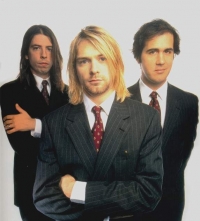
Nirvana was an American rock band that was formed by singer/guitarist Kurt Cobain and bassist Krist Novoselic in Aberdeen, Washington. Nirvana went through a succession of drummers, the longest-lasting being Dave Grohl, who joined the band in 1990.
With the lead single "Smells Like Teen Spirit" from the group's second album Nevermind (1991), Nirvana entered into the mainstream, bringing along with it a subgenre of alternative rock called grunge. Other Seattle grunge bands such as Alice in Chains, Pearl Jam, and Soundgarden also gained popularity, and, as a result, alternative rock became a dominant genre on radio and music television in the United States during the early-to-middle 1990s. As Nirvana's frontman, Kurt Cobain found himself referred to in the media as the "spokesman of a generation", with Nirvana the "flagship band" of "Generation X". Cobain was uncomfortable with the attention and placed his focus on the band's music, challenging the band's audience with its third studio album In Utero (1993).
Nirvana's brief run ended with Cobain's death in April 1994, but the band's popularity continued in the years that followed. In 2002, "You Know You're Right", an unfinished demo from the band's final recording session, topped radio playlists around the world. Since their debut, the band has sold over fifty million albums worldwide. Nirvana are often credited with being one of the most popular and important rock bands of recent years.
With the lead single "Smells Like Teen Spirit" from the group's second album Nevermind (1991), Nirvana entered into the mainstream, bringing along with it a subgenre of alternative rock called grunge. Other Seattle grunge bands such as Alice in Chains, Pearl Jam, and Soundgarden also gained popularity, and, as a result, alternative rock became a dominant genre on radio and music television in the United States during the early-to-middle 1990s. As Nirvana's frontman, Kurt Cobain found himself referred to in the media as the "spokesman of a generation", with Nirvana the "flagship band" of "Generation X". Cobain was uncomfortable with the attention and placed his focus on the band's music, challenging the band's audience with its third studio album In Utero (1993).
Nirvana's brief run ended with Cobain's death in April 1994, but the band's popularity continued in the years that followed. In 2002, "You Know You're Right", an unfinished demo from the band's final recording session, topped radio playlists around the world. Since their debut, the band has sold over fifty million albums worldwide. Nirvana are often credited with being one of the most popular and important rock bands of recent years.
Wicked

Wicked is a musical with songs and lyrics by Stephen Schwartz and a book by Winnie Holzman. The story is based on the best-selling novel Wicked: The Life and Times of the Wicked Witch of the West by Gregory Maguire, a parallel novel of L. Frank Baum's classic story The Wonderful Wizard of Oz from the perspective of the witches of the Land of Oz.
Wicked tells the story of Elphaba, the future Wicked Witch of the West and her relationship with Glinda, the Good Witch of the North. Their friendship struggles through their opposing personalities and viewpoints, rivalry over the same love-interest, their reactions to the Wizard's corrupt government, and, ultimately, Elphaba's public fall from grace. The plot is set mostly before Dorothy's arrival from Kansas, and includes several references to well-known scenes and dialogue in the 1939 film The Wizard of Oz.
The musical debuted on Broadway on October 30, 2003. It is produced by Universal Pictures and directed by Joe Mantello, with musical staging by Wayne Cilento. Its original stars were Idina Menzel as Elphaba, Kristin Chenoweth as Glinda, and Joel Grey as the Wizard. Although the production received mixed reviews and was panned by The New York Times, it has proved to be a favorite among patrons. The Broadway production's success spawned productions in Chicago, Los Angeles, London's West End, Tokyo, Melbourne, and Stuttgart, along with two North American tours that have visited over 30 cities in Canada and the United States.
The score of Wicked is heavily thematic, bearing in some senses more resemblance to a film score than a musical's score. While many musicals' scores develop new motifs and melodies for each song with little overlap, Schwartz integrated a handful of leitmotifs throughout the production. A cast recording of the original Broadway production was released on December 16, 2003, by Universal Music. All of the songs featured on stage are present on the recording with the exception of "The Wizard And I (Reprise)" and "The Wicked Witch of the East". The short reprise of "No One Mourns The Wicked" that opens Act II is attached to the beginning of "Thank Goodness". The music was arranged by Stephen Oremus, who was also the conductor and director, and James Lynn Abbott, with orchestrations by William David Brohn. The recording received the Grammy Award for Best Musical Show Album in 2005 and was certified platinum by the RIAA on November 30, 2006.
Wicked tells the story of Elphaba, the future Wicked Witch of the West and her relationship with Glinda, the Good Witch of the North. Their friendship struggles through their opposing personalities and viewpoints, rivalry over the same love-interest, their reactions to the Wizard's corrupt government, and, ultimately, Elphaba's public fall from grace. The plot is set mostly before Dorothy's arrival from Kansas, and includes several references to well-known scenes and dialogue in the 1939 film The Wizard of Oz.
The musical debuted on Broadway on October 30, 2003. It is produced by Universal Pictures and directed by Joe Mantello, with musical staging by Wayne Cilento. Its original stars were Idina Menzel as Elphaba, Kristin Chenoweth as Glinda, and Joel Grey as the Wizard. Although the production received mixed reviews and was panned by The New York Times, it has proved to be a favorite among patrons. The Broadway production's success spawned productions in Chicago, Los Angeles, London's West End, Tokyo, Melbourne, and Stuttgart, along with two North American tours that have visited over 30 cities in Canada and the United States.
The score of Wicked is heavily thematic, bearing in some senses more resemblance to a film score than a musical's score. While many musicals' scores develop new motifs and melodies for each song with little overlap, Schwartz integrated a handful of leitmotifs throughout the production. A cast recording of the original Broadway production was released on December 16, 2003, by Universal Music. All of the songs featured on stage are present on the recording with the exception of "The Wizard And I (Reprise)" and "The Wicked Witch of the East". The short reprise of "No One Mourns The Wicked" that opens Act II is attached to the beginning of "Thank Goodness". The music was arranged by Stephen Oremus, who was also the conductor and director, and James Lynn Abbott, with orchestrations by William David Brohn. The recording received the Grammy Award for Best Musical Show Album in 2005 and was certified platinum by the RIAA on November 30, 2006.
Randy Newman
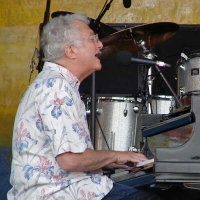
Randall Stuart “Randy” Newman (born November 28, 1943) is an American singer/songwriter, arranger, composer, and pianist who is notable for his mordant (and often satirical) pop songs and for his many film scores.
Newman is noted for his practice of writing lyrics from the perspective of a character far removed from Newman's own biography. For example, the 1972 song "Sail Away" is written as a slave trader's sales pitch to attract slaves, while the narrator of "Political Science" is a U.S. nationalist who complains of worldwide ingratitude toward America and proposes a brutally ironic final solution. One of his biggest hits, "Short People" was written from the perspective of "a lunatic" who hates short people. Since the 1980s, Newman has worked mostly as a film composer. His film scores include Ragtime, Awakenings, The Natural, Leatherheads, James and the Giant Peach, Meet the Parents and Seabiscuit. He has scored five Disney-Pixar films: Toy Story, A Bug's Life, Toy Story 2, Monsters, Inc. and Cars. Most recently he scored Princess and the Frog and is set to return for Toy Story 3 and Cars 2.
He has been singled out for a number of awards by his colleagues, including an Academy Award, two Emmy Awards, four Grammy Awards, and the Governor's Award from the Recording Academy. Randy Newman was inducted into the Songwriters Hall of Fame in 2002. In 2007, Newman was inducted as a Disney Legend.
Newman is noted for his practice of writing lyrics from the perspective of a character far removed from Newman's own biography. For example, the 1972 song "Sail Away" is written as a slave trader's sales pitch to attract slaves, while the narrator of "Political Science" is a U.S. nationalist who complains of worldwide ingratitude toward America and proposes a brutally ironic final solution. One of his biggest hits, "Short People" was written from the perspective of "a lunatic" who hates short people. Since the 1980s, Newman has worked mostly as a film composer. His film scores include Ragtime, Awakenings, The Natural, Leatherheads, James and the Giant Peach, Meet the Parents and Seabiscuit. He has scored five Disney-Pixar films: Toy Story, A Bug's Life, Toy Story 2, Monsters, Inc. and Cars. Most recently he scored Princess and the Frog and is set to return for Toy Story 3 and Cars 2.
He has been singled out for a number of awards by his colleagues, including an Academy Award, two Emmy Awards, four Grammy Awards, and the Governor's Award from the Recording Academy. Randy Newman was inducted into the Songwriters Hall of Fame in 2002. In 2007, Newman was inducted as a Disney Legend.
Robert Kelly

Robert Sylvester Kelly (born January 8, 1967) is an American singer, songwriter, record producer, and philanthropist. He has been accused of numerous cases of sexual abuse. Kelly has been credited with helping to redefine R&B and hip hop, earning nicknames such as "the King of R&B", "the King of Pop-Soul", and the "Pied Piper of R&B".Kelly is known for songs including "I Believe I Can Fly", "Bump N' Grind", "Your Body's Callin'", "Gotham City", "Ignition (Remix)", "If I Could Turn Back the Hands of Time", "The World's Greatest", "I'm a Flirt (Remix)", and the hip-hopera "Trapped in the Closet". In 1998, Kelly won three Grammy Awards for "I Believe I Can Fly".
Richard Clayderman

Richard Clayderman (born Philippe Pagès on December 28, 1953, Paris) is a French pianist who has released numerous albums including the original compositions by Paul de Senneville and Olivier Toussaint, and instrumental renditions of popular music, rearrangements of movie sound tracks, ethnic music, and easy-listening arrangements of most popular works of classical music.
In 1976 he was invited from Olivier Toussaint a French record producer and his partner Paul de Senneville to record a gentle piano ballad. Paul de Senneville had composed this ballad as a tribute to his new born daughter “Adeline”. The 23 year old Philippe Pagès was auditioned along with 20 other pianists. They liked his special and soft touch on the keyboards combined with his good looks and fine personality, and finally he got the job.
Philippe Pagès' name was changed to Richard Clayderman (he adopted his great-grandmother's last name to avoid mispronunciation of his real name outside France), and the single took off, selling an astonishing 22 million copies in 38 countries. It was called Ballade pour Adeline.
In 1976 he was invited from Olivier Toussaint a French record producer and his partner Paul de Senneville to record a gentle piano ballad. Paul de Senneville had composed this ballad as a tribute to his new born daughter “Adeline”. The 23 year old Philippe Pagès was auditioned along with 20 other pianists. They liked his special and soft touch on the keyboards combined with his good looks and fine personality, and finally he got the job.
Philippe Pagès' name was changed to Richard Clayderman (he adopted his great-grandmother's last name to avoid mispronunciation of his real name outside France), and the single took off, selling an astonishing 22 million copies in 38 countries. It was called Ballade pour Adeline.
Madonna

Madonna Louise Ciccone Ritchie (born August 16, 1958), known as Madonna, is an American recording artist and entertainer. Born in Bay City, Michigan and raised in Rochester Hills, Michigan, Madonna moved to New York City for a career in modern dance. After performing as member of the pop musical groups Breakfast Club and Emmy, she released her self-titled debut album in 1983, and then produced three consecutive number-one studio albums on the Billboard 200 in the 1980s.
Madonna is known for her works that explore religious symbolism and sexual themes which also drew criticism from the Vatican in the late 1980s. In 1992, she founded an entertainment company, Maverick, which published a book of photographs (Sex). She also released a studio album (Erotica) and starred in a film (Body of Evidence) with erotic themes. These works generated negative publicity and coincided with a fall in commercial sales in the 1990s. Madonna's career was revived in 1998, when the release of her album Ray of Light garnered critical acclaim. She subsequently made four consecutive number-one studio albums.
Madonna has acted in 22 films. Although several failed critically and commercially, she earned a Golden Globe Award for her role in the 1996 film Evita. Divorced from actor Sean Penn, Madonna bore a daughter by personal trainer Carlos Leon before marrying film director Guy Ritchie. She and Richie have a son and in 2008 they adopted a second, Malawian David Banda, over media allegations they violated that country's adoption laws.
Madonna is known for her works that explore religious symbolism and sexual themes which also drew criticism from the Vatican in the late 1980s. In 1992, she founded an entertainment company, Maverick, which published a book of photographs (Sex). She also released a studio album (Erotica) and starred in a film (Body of Evidence) with erotic themes. These works generated negative publicity and coincided with a fall in commercial sales in the 1990s. Madonna's career was revived in 1998, when the release of her album Ray of Light garnered critical acclaim. She subsequently made four consecutive number-one studio albums.
Madonna has acted in 22 films. Although several failed critically and commercially, she earned a Golden Globe Award for her role in the 1996 film Evita. Divorced from actor Sean Penn, Madonna bore a daughter by personal trainer Carlos Leon before marrying film director Guy Ritchie. She and Richie have a son and in 2008 they adopted a second, Malawian David Banda, over media allegations they violated that country's adoption laws.
Michael Jackson

Michael Joseph Jackson (August 29, 1958 – June 25, 2009) was an American singer, dancer and entertainer. Referred to as the King of Pop, he is the most commercially successful entertainer of all time, and one of the most influential. His contributions to music, dance and fashion, along with a much publicized personal life, made him a global figure in popular culture for over four decades.
Alongside his brothers, he made his debut as lead singer and youngest member of The Jackson 5 in 1964. He began his solo career in 1971. His 1982 album Thriller remains the best-selling album ever, with Off the Wall (1979), Bad (1987), Dangerous (1991) and HIStory (1995) also among the world's best-selling albums. He is widely credited with having transformed the music video from a promotional tool into an art form with videos for his songs such as "Billie Jean", "Beat It" and "Thriller" making him the first African American artist to amass a strong crossover following on MTV. With stage performances and music videos, Jackson popularized a number of physically complicated dance techniques, such as the robot and the moonwalk. His distinctive musical sound, vocal style, and choreography, is credited with stretching across and breaking down cultural, racial, economic, generational, and global barriers that has inspired countless pop, rock, R&B and hip hop artists.
One of the few artists to have been inducted into the Rock and Roll Hall of Fame twice, his other achievements feature multiple Guinness World Records—including the "Most Successful Entertainer of All Time"—15 Grammy Awards (including the "Living Legend Award" and the "Lifetime Achievement Award"), 26 American Music Awards (24 only as a solo artist, including one for "Artist of the Century")—more than any artist—, 17 number one singles in the US (including the four as a member of the Jackson 5), and estimated sales of up to 750 million records worldwide making him the world's best selling artist in history.
Jackson's personal relationships and life generated controversy for years. His changing appearance was noticed from the late 1970s onwards, with changes to his nose and to the color of his skin drawing media publicity. He was accused of child sexual abuse in 1993 though no charges were brought, and in 2005 he was tried and acquitted when the jury ruled him not guilty on all charges. He married twice, first in 1994 and again in 1996, and brought up three children, one born to a surrogate mother. While preparing for the This Is It concert tour in 2009, Jackson died at the age of 50 after suffering from cardiac arrest. He reportedly had been administered drugs such as propofol and lorazepam, and his death was ruled a homicide by the Los Angeles County coroner. His death triggered an outpouring of grief from around the world with his globally live broadcast memorial service attracting an audience of up to one billion people; as well as a huge surge in his album sales, resulting in him becoming the best selling artist of 2009 with sales in excess of 8.2 million in the United States where he became the first artist ever to have 4 of the top 20 best-selling albums in a single year, and 29 million albums globally, where he had an unprecedented 8 of the top 25 best-selling albums worldwide.
Alongside his brothers, he made his debut as lead singer and youngest member of The Jackson 5 in 1964. He began his solo career in 1971. His 1982 album Thriller remains the best-selling album ever, with Off the Wall (1979), Bad (1987), Dangerous (1991) and HIStory (1995) also among the world's best-selling albums. He is widely credited with having transformed the music video from a promotional tool into an art form with videos for his songs such as "Billie Jean", "Beat It" and "Thriller" making him the first African American artist to amass a strong crossover following on MTV. With stage performances and music videos, Jackson popularized a number of physically complicated dance techniques, such as the robot and the moonwalk. His distinctive musical sound, vocal style, and choreography, is credited with stretching across and breaking down cultural, racial, economic, generational, and global barriers that has inspired countless pop, rock, R&B and hip hop artists.
One of the few artists to have been inducted into the Rock and Roll Hall of Fame twice, his other achievements feature multiple Guinness World Records—including the "Most Successful Entertainer of All Time"—15 Grammy Awards (including the "Living Legend Award" and the "Lifetime Achievement Award"), 26 American Music Awards (24 only as a solo artist, including one for "Artist of the Century")—more than any artist—, 17 number one singles in the US (including the four as a member of the Jackson 5), and estimated sales of up to 750 million records worldwide making him the world's best selling artist in history.
Jackson's personal relationships and life generated controversy for years. His changing appearance was noticed from the late 1970s onwards, with changes to his nose and to the color of his skin drawing media publicity. He was accused of child sexual abuse in 1993 though no charges were brought, and in 2005 he was tried and acquitted when the jury ruled him not guilty on all charges. He married twice, first in 1994 and again in 1996, and brought up three children, one born to a surrogate mother. While preparing for the This Is It concert tour in 2009, Jackson died at the age of 50 after suffering from cardiac arrest. He reportedly had been administered drugs such as propofol and lorazepam, and his death was ruled a homicide by the Los Angeles County coroner. His death triggered an outpouring of grief from around the world with his globally live broadcast memorial service attracting an audience of up to one billion people; as well as a huge surge in his album sales, resulting in him becoming the best selling artist of 2009 with sales in excess of 8.2 million in the United States where he became the first artist ever to have 4 of the top 20 best-selling albums in a single year, and 29 million albums globally, where he had an unprecedented 8 of the top 25 best-selling albums worldwide.
Culture Club

Culture Club are an English pop group that formed in London in 1981. The band comprises Boy George, Roy Hay, Mikey Craig and Jon Moss. They are considered one of the most representative and influential groups of the 1980s.
Joseph Kosma
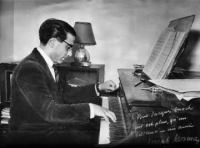
Joseph Kosma was a Hungarian-French composer. Date of birth: October 22, 1905, Budapest, Hungary Date and place of death: August 7, 1969, France
Adele

Adele Laurie Blue Adkins (born 5 May 1988 in Enfield, North London), She is the first recipient of the Brit Awards Critics' Choice, which was given to artists who, at the time, had yet to release an album. She debuted at number one with her Mercury Prize nominated debut album 19 in the UK album chart and has since then been certified platinum with sales over 500,000 copies.
Handel

George Frideric Handel (Friday, 23 February 1685 - Saturday, 14 April 1759) was a German-born Baroque composer who is famous for his operas, oratorios and concerti grossi. Born as Georg Friedrich Handel in Halle, he spent most of his adult life in England, becoming a subject of the British crown on 22 January 1727. His most famous works are Messiah, an oratorio set to texts from the King James Bible; Water Music; and Music for the Royal Fireworks. Strongly influenced by the techniques of the great composers of the Italian Baroque and the English composer Henry Purcell, his music was known to many significant composers who came after him, including Haydn, Mozart, and Beethoven.
Handel's compositions include 42 operas; 29 oratorios; more than 120 cantatas, trios and duets; numerous arias; chamber music; a large number of ecumenical pieces; odes and serenatas; and sixteen organ concerti. His most famous work, the Messiah oratorio with its "Hallelujah" chorus, is among the most popular works in choral music and has become a centerpiece of the Christmas season. Also popular are the Opus 3 and 6 Concerti Grossi, as well as "The Cuckoo and the Nightingale", in which birds are heard calling during passages played in different keys representing the vocal ranges of two birds. Also notable are his sixteen keyboard suites, especially The Harmonious Blacksmith.
Handel introduced various previously uncommon musical instruments in his works: the viola d'amore and violetta marina (Orlando), the lute (Ode for St. Cecilia's Day), three trombones (Saul), clarinets or small high cornets (Tamerlano), theorbo, French horn (Water Music), lyrichord, double bassoon, viola da gamba, bell chimes, positive organ, and harp (Giulio Cesare, Alexander's Feast).
Handel's compositions include 42 operas; 29 oratorios; more than 120 cantatas, trios and duets; numerous arias; chamber music; a large number of ecumenical pieces; odes and serenatas; and sixteen organ concerti. His most famous work, the Messiah oratorio with its "Hallelujah" chorus, is among the most popular works in choral music and has become a centerpiece of the Christmas season. Also popular are the Opus 3 and 6 Concerti Grossi, as well as "The Cuckoo and the Nightingale", in which birds are heard calling during passages played in different keys representing the vocal ranges of two birds. Also notable are his sixteen keyboard suites, especially The Harmonious Blacksmith.
Handel introduced various previously uncommon musical instruments in his works: the viola d'amore and violetta marina (Orlando), the lute (Ode for St. Cecilia's Day), three trombones (Saul), clarinets or small high cornets (Tamerlano), theorbo, French horn (Water Music), lyrichord, double bassoon, viola da gamba, bell chimes, positive organ, and harp (Giulio Cesare, Alexander's Feast).
Franz Schubert

Franz Peter Schubert (German pronunciation: ; January 31, 1797 – November 19, 1828) was an Austrian composer. He wrote some 600 Lieder, nine symphonies (including the famous "Unfinished Symphony"), liturgical music, operas, some incidental music, and a large body of chamber and solo piano music. He is particularly noted for his original melodic and harmonic writing.
Schubert was born into a musical family, and received formal musical training through much of his childhood. While Schubert had a close circle of friends and associates who admired his work (amongst them the prominent singer Johann Michael Vogl), wide appreciation of his music during his lifetime was limited at best. He was never able to secure adequate permanent employment, and for most of his career he relied on the support of friends and family. He made some money from published works, and occasionally gave private musical instruction. In the last year of his life he began to receive wider acclaim. He died at the age of 31 of "typhoid fever", a diagnosis which was vague at the time; several scholars suspect the real illness was tertiary syphilis.
Interest in Schubert's work increased dramatically in the decades following his death. Composers like Franz Liszt, Robert Schumann and Felix Mendelssohn discovered, collected, and championed his works in the 19th century, as did musicologist Sir George Grove. Franz Schubert is now widely considered to be one of the greatest composers in the Western tradition.
Schubert was born into a musical family, and received formal musical training through much of his childhood. While Schubert had a close circle of friends and associates who admired his work (amongst them the prominent singer Johann Michael Vogl), wide appreciation of his music during his lifetime was limited at best. He was never able to secure adequate permanent employment, and for most of his career he relied on the support of friends and family. He made some money from published works, and occasionally gave private musical instruction. In the last year of his life he began to receive wider acclaim. He died at the age of 31 of "typhoid fever", a diagnosis which was vague at the time; several scholars suspect the real illness was tertiary syphilis.
Interest in Schubert's work increased dramatically in the decades following his death. Composers like Franz Liszt, Robert Schumann and Felix Mendelssohn discovered, collected, and championed his works in the 19th century, as did musicologist Sir George Grove. Franz Schubert is now widely considered to be one of the greatest composers in the Western tradition.
Simon and Garfunkel
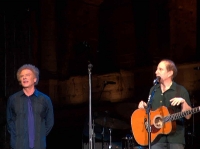
Simon & Garfunkel is an American singer-songwriter duo consisting of Paul Simon and Art Garfunkel. They formed the group Tom & Jerry in 1957, and had their first taste of success with the minor hit "Hey, Schoolgirl". As Simon & Garfunkel, the duo rose to fame in 1965, backed by the hit single "The Sounds of Silence". Their music was featured in the landmark film The Graduate, propelling them further into the public consciousness.
They are well known for their close vocal harmonies and sometimes unstable relationship. Their last album, Bridge over Troubled Water, was delayed several times due to artistic disagreements. They were among the most popular recording artists of the 1960s; among their biggest hits, in addition to "The Sounds of Silence", were "I Am a Rock", "Homeward Bound", "A Hazy Shade of Winter", "Mrs. Robinson", "Bridge over Troubled Water", "The Boxer", "Cecilia", and "Scarborough Fair/Canticle". They have received several Grammys and are inductees of the Rock and Roll Hall of Fame and the Long Island Music Hall of Fame (2007). They have reunited on several occasions since their 1970 breakup, most famously for 1981's The Concert in Central Park, which attracted about 500,000 people.
They are well known for their close vocal harmonies and sometimes unstable relationship. Their last album, Bridge over Troubled Water, was delayed several times due to artistic disagreements. They were among the most popular recording artists of the 1960s; among their biggest hits, in addition to "The Sounds of Silence", were "I Am a Rock", "Homeward Bound", "A Hazy Shade of Winter", "Mrs. Robinson", "Bridge over Troubled Water", "The Boxer", "Cecilia", and "Scarborough Fair/Canticle". They have received several Grammys and are inductees of the Rock and Roll Hall of Fame and the Long Island Music Hall of Fame (2007). They have reunited on several occasions since their 1970 breakup, most famously for 1981's The Concert in Central Park, which attracted about 500,000 people.
Jerry Brubaker
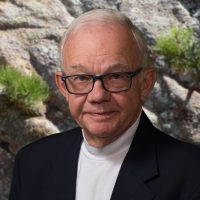
Jerry Brubaker (born 1946) is an American composer and arranger of more than 200 works of music for concert band, symphony, and chorus and a professional French horn soloist.In 1968, Brubaker received his undergraduate degree from the Eastman School of Music and later pursued a Master of Music degree from the Catholic University of America.
Juan García de Zéspedes
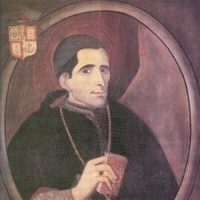
Juan García de Zéspedes was a Mexican composer, singer, viol player, and teacher. Born: 1619, Puebla, Mexico
Died: August 5, 1678, Puebla, Mexico Genre: Classical
Died: August 5, 1678, Puebla, Mexico Genre: Classical
Bach

Johann Sebastian Bach (31 March 1685 – 28 July 1750) was a German composer and organist whose sacred and secular works for choir, orchestra, and solo instruments drew together the strands of the Baroque period and brought it to its ultimate maturity. Although he introduced no new forms, he enriched the prevailing German style with a robust contrapuntal technique, an unrivalled control of harmonic and motivic organisation in composition for diverse musical forces, and the adaptation of rhythms and textures from abroad, particularly Italy and France.
Revered for their intellectual depth and technical and artistic beauty, Bach's works include the Brandenburg concertos; the Goldberg Variations; the English Suites, French Suites, Partitas, and Well-Tempered Clavier; the Mass in B Minor; the St. Matthew Passion; the St. John Passion; The Musical Offering; The Art of Fugue; the Sonatas and Partitas for violin solo; the Cello Suites; more than 200 surviving cantatas; and a similar number of organ works, including the celebrated Toccata and Fugue in D Minor.
While Bach's fame as an organist was great during his lifetime, he was not particularly well-known as a composer. His adherence to Baroque forms and contrapuntal style was considered "old-fashioned" by his contemporaries, especially late in his career when the musical fashion tended towards Rococo and later Classical styles. A revival of interest and performances of his music began early in the 19th century, and he is now widely considered to be one of the greatest composers in the Western tradition.
Revered for their intellectual depth and technical and artistic beauty, Bach's works include the Brandenburg concertos; the Goldberg Variations; the English Suites, French Suites, Partitas, and Well-Tempered Clavier; the Mass in B Minor; the St. Matthew Passion; the St. John Passion; The Musical Offering; The Art of Fugue; the Sonatas and Partitas for violin solo; the Cello Suites; more than 200 surviving cantatas; and a similar number of organ works, including the celebrated Toccata and Fugue in D Minor.
While Bach's fame as an organist was great during his lifetime, he was not particularly well-known as a composer. His adherence to Baroque forms and contrapuntal style was considered "old-fashioned" by his contemporaries, especially late in his career when the musical fashion tended towards Rococo and later Classical styles. A revival of interest and performances of his music began early in the 19th century, and he is now widely considered to be one of the greatest composers in the Western tradition.
Delibes
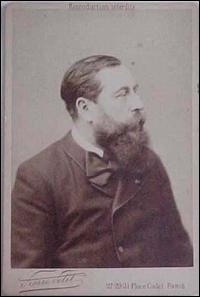
Clément Philibert Léo Delibes (21 February 1836 – 16 January 1891) was a French composer of ballets, operas, and other works for the stage.
OneRepublic

OneRepublic is an American Rock band formed in Colorado. After a few years of moderate success, they have since drawn mainstream attention with the release of their single "Apologize," which has sold in excess of 7 million singles worldwide. The song, according to SoundScan Data, is one of only two songs that have reached 3 million legal downloads in history. A remix of "Apologize" was featured on Timbaland's Shock Value and the band's debut album, Dreaming Out Loud, produced by Greg Wells. Their debut album was released in the United States on November 20, 2007, with international release dates staggered throughout early 2008. As of June 14, 2008, Dreaming Out Loud had sold 761,298 copies in the U.S. with the bands total album sales coming to over 1.5 million worldwide so far. The band's second single, "Stop and Stare," has also crossed the 2 million mark in terms of worldwide single sales. Their third single, "Say (All I Need)", has been released in the UK and in the U.S. Their fourth single will be "Mercy", as stated by OneRepublic's MySpace page. The video has been streamed on Youtube.com.
Current members:
Ryan Tedder – Lead vocals, Guitar, Bass Guitar, Piano, Glockenspiel, Drums (2002–present)
Zach Filkins – Guitar, vocals (2002–present)
Drew Brown – Guitar, Bass Guitar, Glockenspiel (2002–present)
Eddie Fisher – Drums, percussion (2005–present)
Brent Kutzle – Bass guitar, keyboards, cello, vocals (2007–present)
Current members:
Ryan Tedder – Lead vocals, Guitar, Bass Guitar, Piano, Glockenspiel, Drums (2002–present)
Zach Filkins – Guitar, vocals (2002–present)
Drew Brown – Guitar, Bass Guitar, Glockenspiel (2002–present)
Eddie Fisher – Drums, percussion (2005–present)
Brent Kutzle – Bass guitar, keyboards, cello, vocals (2007–present)
Rent

Rent is a rock musical, with music and lyrics by Jonathan Larson based on Giacomo Puccini's opera La Bohème. It tells the story of a group of impoverished young artists and musicians struggling to survive and create in New York's Lower East Side in the thriving days of the Bohemian East Village, under the shadow of AIDS.
Rent won a Tony Award for Best Musical and a Pulitzer Prize, among other awards. In addition, its cast was unusually ethnically diverse. Rent brought controversial topics to a traditionally conservative medium, and it helped to increase the popularity of musical theater amongst the younger generation. "Rent speaks to Generation X the way that the musical Hair spoke to the baby boomers or those who grew up in the 1960s, calling it "a rock opera for our time, a Hair for the 90s."
The musical was first seen at the New York Theatre Workshop in 1994. On January 26, 1996, Rent opened in New York City off-Broadway before moving to Broadway's Nederlander Theatre on April 29, 1996. Rent has been successful on Broadway, where it had critical acclaim and word-of-mouth popularity. The Broadway production of Rent closed on September 7, 2008 after a 12 year run and 5,124 performances, making it the seventh-longest-running Broadway show. The production has grossed over $280 million. At the time of its closing, it was the second-longest-running musical currently on Broadway, eight years behind The Phantom of the Opera.
Rent won a Tony Award for Best Musical and a Pulitzer Prize, among other awards. In addition, its cast was unusually ethnically diverse. Rent brought controversial topics to a traditionally conservative medium, and it helped to increase the popularity of musical theater amongst the younger generation. "Rent speaks to Generation X the way that the musical Hair spoke to the baby boomers or those who grew up in the 1960s, calling it "a rock opera for our time, a Hair for the 90s."
The musical was first seen at the New York Theatre Workshop in 1994. On January 26, 1996, Rent opened in New York City off-Broadway before moving to Broadway's Nederlander Theatre on April 29, 1996. Rent has been successful on Broadway, where it had critical acclaim and word-of-mouth popularity. The Broadway production of Rent closed on September 7, 2008 after a 12 year run and 5,124 performances, making it the seventh-longest-running Broadway show. The production has grossed over $280 million. At the time of its closing, it was the second-longest-running musical currently on Broadway, eight years behind The Phantom of the Opera.
Eric Whitacre

Eric Edward Whitacre (born January 2, 1970) is an American composer, conductor, and speaker known for his choral, orchestral, and wind ensemble music. In March 2016, he was appointed as Los Angeles Master Chorale's first artist-in-residence at the Walt Disney Concert Hall.
Boston (band)

Boston is an American rock band from Boston, Massachusetts, which had its most notable successes during the 1970s and 1980s. The band is centered on multi-instrumentalist founder and leader Tom Scholz, who played the majority of instruments on the debut album, and lead vocalist Brad Delp. Boston's best-known songs include "More Than a Feeling", "Peace of Mind", "Foreplay/Long Time", "Rock and Roll Band", "Smokin'", "Don't Look Back", "A Man I'll Never Be", and "Amanda".
 Sheet Music Mobile is a site for those who wants to access popular sheet music easily,
letting them download the sheet music for free for trial purposes.
It's completely free to download and try the listed sheet music, but you have to delete the files after 24 hours of trial.
Don't forget, if you like the piece of music you have just learned playing,
treat the artist with respect, and go buy the original sheet music.
Sheet Music Mobile is a site for those who wants to access popular sheet music easily,
letting them download the sheet music for free for trial purposes.
It's completely free to download and try the listed sheet music, but you have to delete the files after 24 hours of trial.
Don't forget, if you like the piece of music you have just learned playing,
treat the artist with respect, and go buy the original sheet music.

